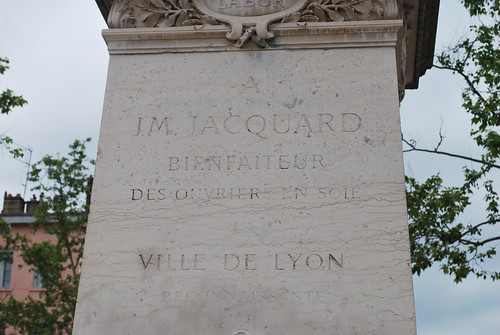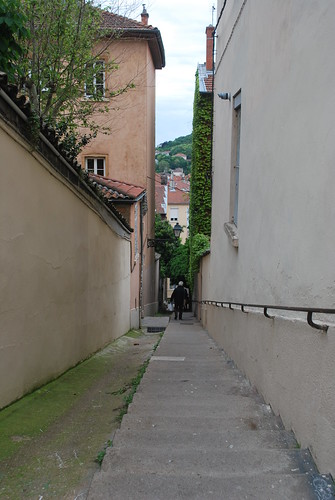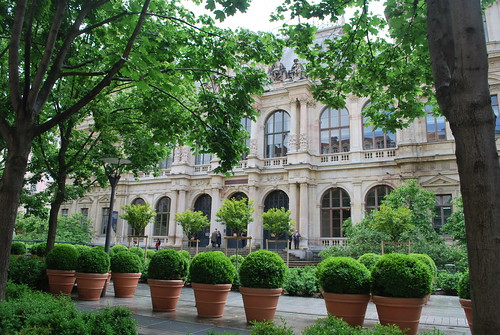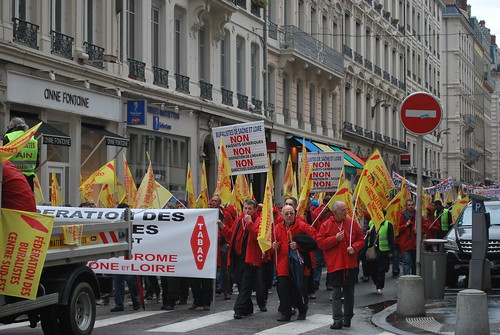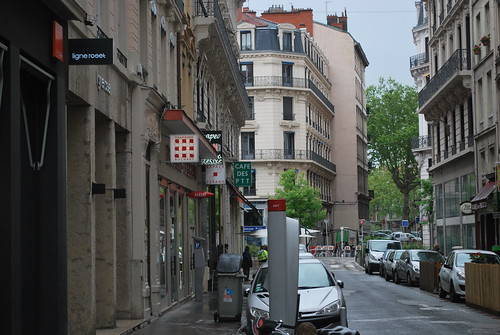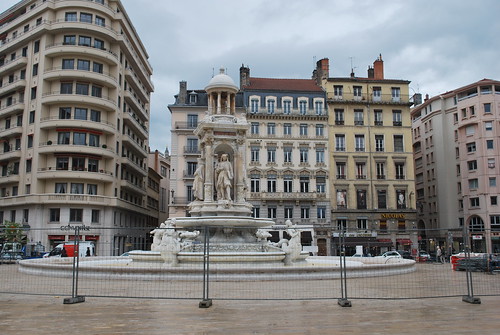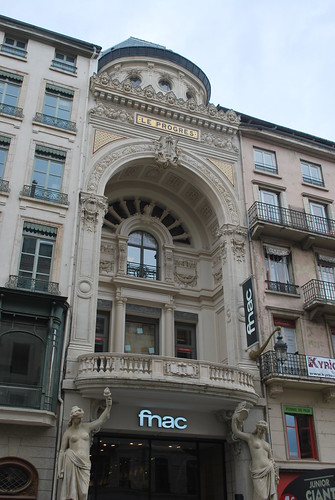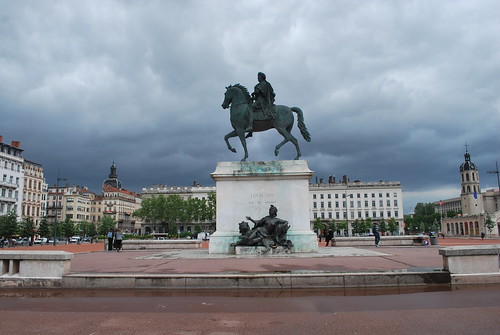Garment of shadows, by Laurie R. King. London: Allison and Busby, 2012.
I did enjoy The pirate king on first reading, checking back... But was extremely glad to see Russell casting off her actor friends and getting back to the plot in this book. There's a slight stretching of credulity at the beginning when Russell develops amnesia, but it does prod the plot along, and gets them back to Middle Eastern derring-do; this time in 1925 Morocco. Couple of nice plot twists, and some detail of the actual politics of the period. Good enjoyable read... This one also contains the novella Beekeeping for beginners which was published as a Kindle standalone; reviewed it earlier this year.
Murder in the Sentier, by Cara Black. New York: Soho, 2002.
Another intrepid female protagonist here in Aimée Leduc, computer consultant and private investigator. When an ex-convict appears claiming to have shared a cell with Aimée's mother, who walked out on the family when Aimée was eight, our girl's understandably curious. When the woman is found dead shortly afterwards, and there are links to a 1970s terror group, Aimée has to investigate; sometimes in a series of very unlikely outfits. I really enjoy these books because the Paris geography is just so excellent; you can walk these books with the map provided in the front, and the atmosphere is spot on. The only thing which jarred in this one was the slightly lame naming of some of the organisations. If the author had used two German surnames, rather than calling the terrorist group "Haader-Rofmein", or had a generic left-wing publishing house rather than using "Tallimard", it would all have been seamless.
A belated catchup on what I read on holiday: books read on the Kindle don't have to go back to the library or head off to the charity shop, so they don't get reviewed.
A textbook case, by Jeffery Deaver. Kindle edition.
This is a novella to introduce The Kill Room, Deaver's newest Lincoln Rhyme novel; and it was an excellent hour or so's read. Although I've enjoyed Deaver's short stories before, something about the shorthand in the writing about characters we know well somehow jarred; but his complete mastery of a plot kicked in. And there are some interesting medical teasers for the next book too (I'm hoping to get hold of it from the library in the next couple of weeks).
The Lewis man, by Peter May. Kindle edition.
The second of this trology. Fin MacLeod has cut ties with the mainland and moved back to Lewis permanently, but can't resist the urge to investigate when a body is found by peat-cutters; the theory that it's a prehistoric bog burial is put paid to when the corpse turns out to be sporting an Elvis tattoo. The body is DNA tested and is found to be closely related to Marsaili, Fin's childhood girlfriend; but Marsaili's father Tormod has always said he was an only child... Tormod is now deep in the throes of dementia, and parts of the narrative show his confusion; Fin has his work cut out to piece together the life story. Gripping, like the first part...
The ides of April, by Lindsey Davis. London: Hodder and Stoughton, 2013.
Taglined Falco: the new generation, which made me worry. Shouldn't have, of course - Flavia Albia is a marvellous character. Davis has wisely taken the action a few years forward, and made Flavia a young widow with an office in Falcon Court, under the reign of Domitian which is considerably more sinister than that of Vespasian. Helena Justina and Falco himself appear as shadowy figures in the background, but the stage is largely left clear for this feisty, articulate investigator. There's one "could have seen it coming a mile off" element to the plot, but it really doesn't matter; with any luck, this is the first of many in this new series. I was sad when Davis announced she'd come to the end of the line with Marcus Didius, but this is a worthy successor.
Sunday, July 28, 2013
Sunday, July 14, 2013
Lyon, day three
Eventually! It's been a very busy last few weekends, and photo-heavy posts are always a bit awkward to put together... but seeing the Tour de France pass through Lyon yesterday gave me an additional push to post this...
So; day three and the Croix-Rousse. Unlike yesterday's cyclists, who made getting up the hill look pretty effortless, I got up there by an extremely sloping Metro train which was halfway to a funicular. Had a wander slightly down the hill to the viewing platform for a look across the city
and then a wander slightly back up to the Place Jacquard. Another textile-linked location with a statue looming (sorry) above it:
I was intending to get there early enough to walk up to the Maison des canuts and find out more about the silk weaving trade in Lyon, but a combination of indolence and a short rainstorm as I was due to set out from the studio meant that's one for next time. (There's definitely going to be a next time...)
Croix-Rousse was recommended by a friend, and it's a lovely bit of town; a little like the quieter bits of Montmartre out of tourist season.
After a wander about, and a purchase of Provençal green beans and olive-wood kitchen implements (box ticked; was really hoping to find some) at the market later, I evaded a creepy man who was intent on taking me for a drink, repaired to a restaurant I'd scoped out on the internet, and had a really excellent lunch with kir à la framboise and pot lyonnais.
(La Coquette, if you're interested; highly recommended. Really nowhere near as formica-heavy as it looks on the photos...)
Another short but very sharp rain shower put me off heading over to further heights/viewpoints, so change of plan to take in the presqu-île. This is, according to my guidebook, the top of the Lyon equivalent of Oxford Street. (I don't think the writers of the guidebook have visited Oxford Street recently. Or, possibly, ever. But Rue de la République does have branches of most of the major chains further into town.)
The Palais de Commerce - most large French towns have one of these, but this one is particularly spectacular.
There was a demonstration, or manifestation as the French have it; this seems to fit pretty well, because with all the whistles and the flags and the police escort, it also feels like a bit of performance art. This was a particularly fine-sounding one, so I stopped to watch. Which noble cause was being fought for? World peace? Education? Liberté, égalité et fraternité?
Ah, they're against the ban on plain cigarette packs and closed displays. Ho hum. But I do like the way they finish with "No to EU Directives", which is at least pretty comprehensive and covers all bases!
One of the (many) things I love about the French is their entirely unimaginative way of naming bars and cafés; when you're casting around for somewhere to sell you stamps for your postcards, having incomprehensibly lost one of the US stamps, seeing this
around the corner is great. Where the Café des Postes, télégraphes et téléphones is, there shall be the post office also. And indeed there was.
Likewise, I wasn't sure whether this was the Place des Terraux or the Place des Jacobins, but helpfully, there's the Café des Jacobins on the right... Likewise, you always know what you're going to get at the Bar des Sports in a small town (lots of blokes, big screen, Baby-foot, possibly pool table, cheap drinks and a high tolerance of horseplay).
Made a quick trip to Fnac; I do love a Fnac shop. This one is particularly fine.
So many of the French singer-songwriters I like haven't produced anything new in the last few years; thankfully Jacques Higelin is still going strong...
One last picture, of the huge and (on that day) rather desolate Place Bellecour; Louis XIV lords (kings?) it over the square...
At that point the heavens opened. I ducked into a bar for a pre-dinner drink, and then home via the butchers - veal chop, bearnaise sauce and Provençal green beans. Heaven. Particularly because I found Un dîner presque parfait which was just lovely - I gather there are similar formats on UK TV but I never have time to catch up with that sort of thing!
Before dinner, I met my lovely landlord, finally - had to pay him for the rent, and while I'd already pretty much settled in, it being the third day of five, he had another couple of hints and tips. One of the first things he spotted was my knitting:
Apparently his wife's a knitter, and he was asking about good UK yarn sites for British wools. I scribbled down some names and URLs including the Ravelry one, just in case!
So; day three and the Croix-Rousse. Unlike yesterday's cyclists, who made getting up the hill look pretty effortless, I got up there by an extremely sloping Metro train which was halfway to a funicular. Had a wander slightly down the hill to the viewing platform for a look across the city
and then a wander slightly back up to the Place Jacquard. Another textile-linked location with a statue looming (sorry) above it:
I was intending to get there early enough to walk up to the Maison des canuts and find out more about the silk weaving trade in Lyon, but a combination of indolence and a short rainstorm as I was due to set out from the studio meant that's one for next time. (There's definitely going to be a next time...)
Croix-Rousse was recommended by a friend, and it's a lovely bit of town; a little like the quieter bits of Montmartre out of tourist season.
After a wander about, and a purchase of Provençal green beans and olive-wood kitchen implements (box ticked; was really hoping to find some) at the market later, I evaded a creepy man who was intent on taking me for a drink, repaired to a restaurant I'd scoped out on the internet, and had a really excellent lunch with kir à la framboise and pot lyonnais.
(La Coquette, if you're interested; highly recommended. Really nowhere near as formica-heavy as it looks on the photos...)
Another short but very sharp rain shower put me off heading over to further heights/viewpoints, so change of plan to take in the presqu-île. This is, according to my guidebook, the top of the Lyon equivalent of Oxford Street. (I don't think the writers of the guidebook have visited Oxford Street recently. Or, possibly, ever. But Rue de la République does have branches of most of the major chains further into town.)
The Palais de Commerce - most large French towns have one of these, but this one is particularly spectacular.
There was a demonstration, or manifestation as the French have it; this seems to fit pretty well, because with all the whistles and the flags and the police escort, it also feels like a bit of performance art. This was a particularly fine-sounding one, so I stopped to watch. Which noble cause was being fought for? World peace? Education? Liberté, égalité et fraternité?
Ah, they're against the ban on plain cigarette packs and closed displays. Ho hum. But I do like the way they finish with "No to EU Directives", which is at least pretty comprehensive and covers all bases!
One of the (many) things I love about the French is their entirely unimaginative way of naming bars and cafés; when you're casting around for somewhere to sell you stamps for your postcards, having incomprehensibly lost one of the US stamps, seeing this
around the corner is great. Where the Café des Postes, télégraphes et téléphones is, there shall be the post office also. And indeed there was.
Likewise, I wasn't sure whether this was the Place des Terraux or the Place des Jacobins, but helpfully, there's the Café des Jacobins on the right... Likewise, you always know what you're going to get at the Bar des Sports in a small town (lots of blokes, big screen, Baby-foot, possibly pool table, cheap drinks and a high tolerance of horseplay).
Made a quick trip to Fnac; I do love a Fnac shop. This one is particularly fine.
So many of the French singer-songwriters I like haven't produced anything new in the last few years; thankfully Jacques Higelin is still going strong...
One last picture, of the huge and (on that day) rather desolate Place Bellecour; Louis XIV lords (kings?) it over the square...
At that point the heavens opened. I ducked into a bar for a pre-dinner drink, and then home via the butchers - veal chop, bearnaise sauce and Provençal green beans. Heaven. Particularly because I found Un dîner presque parfait which was just lovely - I gather there are similar formats on UK TV but I never have time to catch up with that sort of thing!
Before dinner, I met my lovely landlord, finally - had to pay him for the rent, and while I'd already pretty much settled in, it being the third day of five, he had another couple of hints and tips. One of the first things he spotted was my knitting:
Apparently his wife's a knitter, and he was asking about good UK yarn sites for British wools. I scribbled down some names and URLs including the Ravelry one, just in case!
2013 books, #51-55
Bloodline: a Dick Francis novel, by Felix Francis [audiobook]. Read by Michael Maloney. Bath: AudioGO, 2012.
This is a classic from the Francis stable (sorry); so glad Felix Francis has taken on the family business. This time, his protagonist is a young race commentator, Mark Shillingford, with a twin sister who's a top jockey. In a meeting at Lingfield, he sees sister Clare deliberately stop her horse; when he takes her up on it, they argue, and later that night Clare is dead, having jumped from the 11th floor of a London hotel. Or so it seems... This is seriously vintage Francis, without being a complete repetition of what's gone before; and Michael Maloney's reading is excellent, particularly in the commentary sections; he maintains the clipped, stiff-upper-lip decorum of Tony Britton and Nigel Havers while bringing his own edge to it.
Like this, for ever, by S J Bolton. London: Bantam, 2013.
11-year old boys are disappearing from South London and being found by the Thames, their blood drained. Mark Joesbury and Dana Tulloch investigate, but wherever they go, they run into Lacey Flint. Lacey's young neighbour Barney is convinced his dad has a secret; Tulloch suspects Lacey; Lacey and Joesbury carry on their complicated dance. Another excellent, complex thriller from S J Bolton, with some switchback twists and turns. You need to read the other two Joesbury/Flint novels (Now you see me and Dead scared) before this one to understand some of the situation, but it would also work well as a standalone if you're not as hung up as I am on reading books in order!
How to be a woman, by Caitlin Moran. London: Ebury Press, 2011.
I recognised so much in this book, even though I'm four years older than Moran, from a small North East town, not a large West Midlands one, my family was totally different and I've had a completely different life. In fact, I think the only thing we do have in common other than the 80s references (and let's not underestimate those) is both being women. I was shocked, air-punchingly-in-agreement, immensely entertained and very occasionally actually appalled by this book, and would recommend it to anyone with a reasonable tolerance for sex and sweariness. Sometimes Moran will go off on a rant and I'm thinking "sing it, sister!", and then sometimes I'll think "what? hm? hang on!!"; but it's well-written by someone who's never less than compassionate, with a fine self-deprecating edge.
Sidney Chambers and the shadow of death, by James Runcie [audiobook]. Read by Peter Wickham. Oxford, Isis, 2012.
I enjoyed this; a nice gentle read. But I think I'd expected to enjoy it a bit more. Sidney is interesting enough - an upper middle-class vicar of Grantchester - and the Cambridge setting is just right. I think it's the fact that instead of one overarching plot, it's quite episodic, in the tradition of Father Brown. I also didn't have a lot of sympathy for the main female character...If you like the "cosy" end of detective fiction, this is one for you. And as ever, I'd recommend Peter Wickham's reading for this sort of book.
The Dazzle, by Robert Hudson. London: Jonathan Cape, 2013.
A novel about a strange phenomenon in 20th century history, the tuna-fishing craze centred around Scarborough in the 1930s. The book's much more than that, though - Hudson seems to capture exactly the sort of cast-adrift, aimless self-destruction of the inter-war fast set which is depicted in books by Dornford Yates, and in the party set shown so well by Sayers in Murder must advertise. Well known real-life characters such as Martha Gellhorn and Zane Grey feature along with real tuna-fishers from the period and fictional additions, and the tuna-fishing expedition turns out to cover something entirely more sinister. The narration takes place from several shifting, unreliable positions, and important events have several versions... An excellent novel from one of the co-writers of Radio 4's Warhorses of letters.
Sidney Chambers and the shadow of death, by James Runcie [audiobook]. Read by Peter Wickham. Oxford, Isis, 2012.
I enjoyed this; a nice gentle read. But I think I'd expected to enjoy it a bit more. Sidney is interesting enough - an upper middle-class vicar of Grantchester - and the Cambridge setting is just right. I think it's the fact that instead of one overarching plot, it's quite episodic, in the tradition of Father Brown. I also didn't have a lot of sympathy for the main female character...If you like the "cosy" end of detective fiction, this is one for you. And as ever, I'd recommend Peter Wickham's reading for this sort of book.
The Dazzle, by Robert Hudson. London: Jonathan Cape, 2013.
A novel about a strange phenomenon in 20th century history, the tuna-fishing craze centred around Scarborough in the 1930s. The book's much more than that, though - Hudson seems to capture exactly the sort of cast-adrift, aimless self-destruction of the inter-war fast set which is depicted in books by Dornford Yates, and in the party set shown so well by Sayers in Murder must advertise. Well known real-life characters such as Martha Gellhorn and Zane Grey feature along with real tuna-fishers from the period and fictional additions, and the tuna-fishing expedition turns out to cover something entirely more sinister. The narration takes place from several shifting, unreliable positions, and important events have several versions... An excellent novel from one of the co-writers of Radio 4's Warhorses of letters.
Saturday, June 22, 2013
A midsummer night's dream
Joss Whedon's Much Ado about Nothing - bunked off work early to see it yesterday afternoon and it's wonderful. See it if you can!
If you've seen anything else by Whedon, the gang's all here. Nathan Fillion has a superb cameo part and Sean Maher is genuinely menacing.
Monday, June 17, 2013
2013 books, #46-50
Pigeon English, by Stephen Kelman. London: Bloomsbury, 2011.
Harrison Opoku is eleven and a recent immigrant from Ghana; when he sees a boy he knows slightly stabbed in the street, he decides to investigate in a Boys' Own Adventure sort of way. Unfortunately he has no idea of the danger he could be leading himself into. This is, however, quite a joyous book; Harri's sense of fun and enjoyment of life come through, and the details of a pre-teen's daily life, from brands of trainers to how he gets on with his big sister, are poured out in an infectiously amusing way. I won't spoiler you for the end of this; two of us in our book group didn't see it coming, the third had read the reviews and did... This was one of the shortlisted books in the "popular" Booker a couple of years ago, and the second we've read as a group; it was a good shortlist!
The betrayal of trust, by Susan Hill. London: Vintage, 2012.
A Simon Serrailler book; and another extremely good novel from Susan Hill. As ever, you get much more than a detective plot from Hill; and how much murder there is in the book is largely the opinion of the reader. The detective plot centres around the discovery of bones belonging to Harriet Lowther, a 15-year-old who vanished 16 years before, in a landslide; subsequently, more bones from an unidentified young woman are found. This is interwoven with the continuing story of Simon and his family, with a generous helping of the continuing discussion of assisted suicide which has run through the series for several books now... Definitely a series you need to read in order, and I have the next one waiting.
Outrage, by Arnaldur Indridason [audiobook]. Read by Garrick Hagon. Bath: Oakhill, [n.d.]
I found this slow to get into, but it built up on me; and the details about Icelandic society are always very interesting. There are holes in the plot, I think, but this may have been my earlier inattention, and I really didn't enjoy Garrick Hagon's reading of this all that much. Perhaps it was having an Icelandic novel read to me in an American accent, even with a reader as skilled as Hagon, which just didn't strike the right note.
A question of identity, by Susan Hill. London: Chatto and Windus, 2012.
The most recent Simon Serrailler and entirely up to standard. Old ladies in a new sheltered housing development are being killed in a characteristic way, and there's a connection with an earlier series of murders I guessed the identity of the killer fairly early on, without really knowing why I was sure; but that really makes no difference with Hill because the plot isn't all there is. Meanwhile Simon's life takes another turn, and another family secret develops.
White nights, by Ann Cleeves. London: Pan, 2009.
At an art exhibition, Jimmy Perez comforts a man who breaks down in front of a painting; twelve hours later, the man is found hanging. When it becomes clear that the death is not a suicide, Perez and his colleague Taylor from Inverness investigate. The Shetland landscape and the intertwined community again play a part in this novel; the "white nights" signify a sort of midsummer madness, where no-one can sleep. Perez's relationship with Fran Hunter develops during this book; I'm keeping my fingers crossed for them...
Harrison Opoku is eleven and a recent immigrant from Ghana; when he sees a boy he knows slightly stabbed in the street, he decides to investigate in a Boys' Own Adventure sort of way. Unfortunately he has no idea of the danger he could be leading himself into. This is, however, quite a joyous book; Harri's sense of fun and enjoyment of life come through, and the details of a pre-teen's daily life, from brands of trainers to how he gets on with his big sister, are poured out in an infectiously amusing way. I won't spoiler you for the end of this; two of us in our book group didn't see it coming, the third had read the reviews and did... This was one of the shortlisted books in the "popular" Booker a couple of years ago, and the second we've read as a group; it was a good shortlist!
The betrayal of trust, by Susan Hill. London: Vintage, 2012.
A Simon Serrailler book; and another extremely good novel from Susan Hill. As ever, you get much more than a detective plot from Hill; and how much murder there is in the book is largely the opinion of the reader. The detective plot centres around the discovery of bones belonging to Harriet Lowther, a 15-year-old who vanished 16 years before, in a landslide; subsequently, more bones from an unidentified young woman are found. This is interwoven with the continuing story of Simon and his family, with a generous helping of the continuing discussion of assisted suicide which has run through the series for several books now... Definitely a series you need to read in order, and I have the next one waiting.
Outrage, by Arnaldur Indridason [audiobook]. Read by Garrick Hagon. Bath: Oakhill, [n.d.]
I found this slow to get into, but it built up on me; and the details about Icelandic society are always very interesting. There are holes in the plot, I think, but this may have been my earlier inattention, and I really didn't enjoy Garrick Hagon's reading of this all that much. Perhaps it was having an Icelandic novel read to me in an American accent, even with a reader as skilled as Hagon, which just didn't strike the right note.
A question of identity, by Susan Hill. London: Chatto and Windus, 2012.
The most recent Simon Serrailler and entirely up to standard. Old ladies in a new sheltered housing development are being killed in a characteristic way, and there's a connection with an earlier series of murders I guessed the identity of the killer fairly early on, without really knowing why I was sure; but that really makes no difference with Hill because the plot isn't all there is. Meanwhile Simon's life takes another turn, and another family secret develops.
White nights, by Ann Cleeves. London: Pan, 2009.
At an art exhibition, Jimmy Perez comforts a man who breaks down in front of a painting; twelve hours later, the man is found hanging. When it becomes clear that the death is not a suicide, Perez and his colleague Taylor from Inverness investigate. The Shetland landscape and the intertwined community again play a part in this novel; the "white nights" signify a sort of midsummer madness, where no-one can sleep. Perez's relationship with Fran Hunter develops during this book; I'm keeping my fingers crossed for them...
Sunday, June 09, 2013
Lyon, day two
So - next day dawned... not exactly bright and clear, but it dawned.
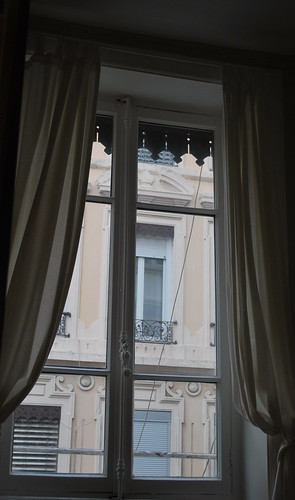
Set off for my first goal, the Musée des tissus et Musée des arts décoratifs. Before that, though, I needed to find a post office. Left the house, found the Metro again (I'd used it the night before but my lack of sense of direction is legendary), and was at the right stop for both, and the right entrance for both, in 15 minutes. Go, me.
Then, things became a little derailed. Walked out of the Metro exit and saw this in the Place Antonin Poncet.
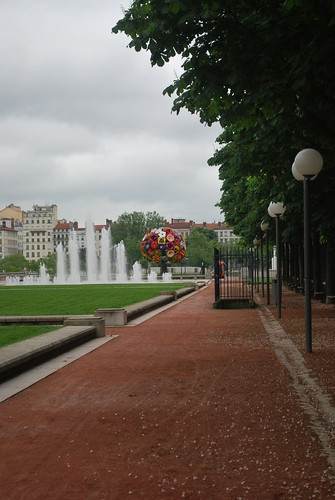
Had to investigate; the colours against that grey, grey sky...
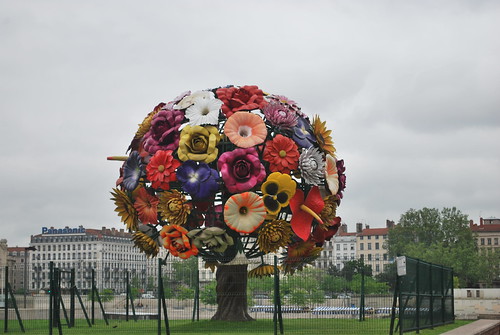
It only got better as you approached it. Metal flowers on a grid...

Joyous thing; great shame they've put it behind a fence...
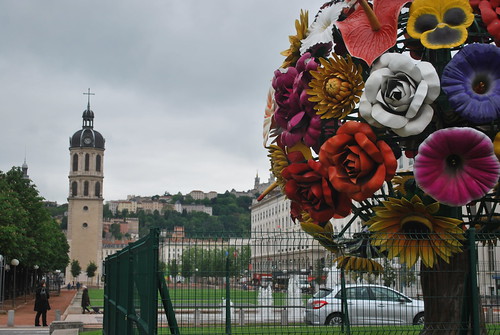
I had to wait until I got home to find out what it was; English-language Wikipedia says the artist is Jeong-hwa Cheoi, French-language Wikipedia says Choi jeong-hwa; both agree that the artist is South Korean and that the piece is called Flower Tree. It was lovely.
ETA advice from a Korean-speaking friend is that it's Choi Jeong-hwa - more strange and beautiful things to be found by following the link.
Had the usual surreal French post office experience; multiplicity of counters but none really seeming to want to sell you stamps...
On the way out though, saw this: yes, you're in Vichy France, love. More of that later.
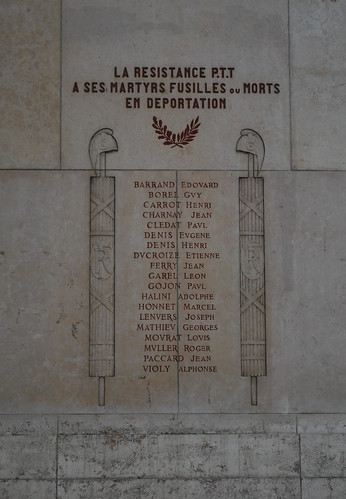
I don't understand why the engraving happened like that though; surely you'd left-justify first names and right-justify surnames? I know that's not the most important thing; but it just made me slightly sad that care hadn't been taken.
After an unfruitful stop at an art supplies shop (they had Herbin paper in the window; I called in to see if they had Herbin ink, but no) I got to the textiles museum:

The Musée des arts décoratifs closes for lunch, so the museum staff were cantering everyone through there first; and frankly, I mostly wish I hadn't bothered. Lots and lots of slightly dusty Louis [insert regnal name here] furniture and rooms. There was, however, one glorious room of "contemporary" silverware; amusingly, the Salvador Dali pieces were invisible to someone my height (5' 3.5") because of the strange shelving... But some of the rest of it... Beautiful.
The Musée des textiles is utterly gobsmacking. There's a whole room of weaving from Egypt in the 2nd-3rd centuries. There are the most beautiful Persian carpets. There are gorgeous Italian vestments from the 15th century. There are several rooms of Lyonnais silks. And the labelling is uniformly rubbish, where it's present at all... But if you get the chance; go. It's amazing... I'd give you a link, but it's broken...
Coming out of there, it was time for lunch. A very good principle discovered a decade and a half ago is "eat where the people who work nearby eat" - when it gets to noon, and all the white vans and utility vans file off at the same motorway exit, follow them... turns out it works on foot, too. When I saw a number of people file out of the police station and go into the bistrot next door, I had a look at the plat du jour and decided that confit de canard might be the way to go. And it was. Great place; confit, pommes dauphinoises et ratatouilles and a glass of good Macon for 12 Euros.
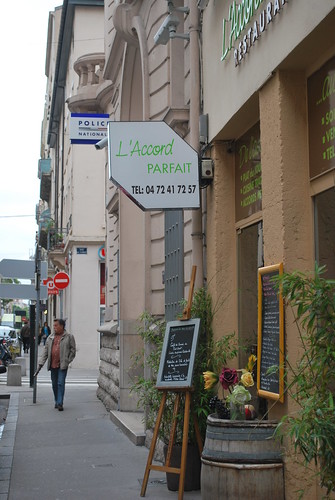
The afternoon was... different. My next destination was somewhat more grim but no less interesting.
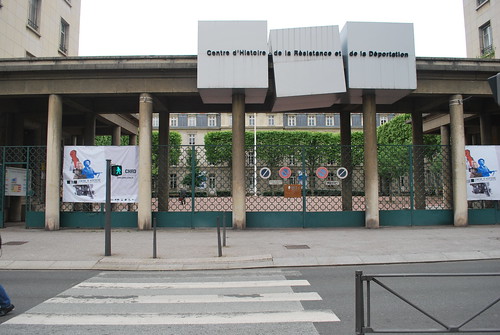
First reaction was that this looked like any secondary school. Turns out that wasn't such a bad preconception; it had been a medical school in the nineteenth century and now has a lot of government agencies in it; but the architecture at the front is post-War because the Americans bombed it quite comprehensively because it was the Gestapo HQ for Lyon. Here's the view from inside the courtyard.
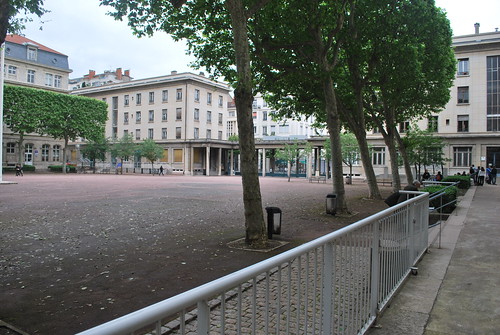
The museum itself is excellent. It's all very wordy, of course; but it has a very large audiovisual element. You can watch and listen to the survivors of the deportation talking about their experiences. There were several secondary school parties going round at the same time, and they were obviously very aware of the history; and I was able to tag along with them to a special screening of a documentary on the Klaus Barbie trial. Not necessarily what you want to be doing on your holiday, but the trial was going on while I was in my first year of college and we followed it quite closely in oral French sessions. I thought I knew a lot about the trial, but actually seeing the footage of survivors giving their testimony was incredibly powerful and I was glad I'd brought tissues. As ever with French teenagers, very impressed by their total silence and attention when something really catches them; lots of irritating mucking about in the museum, total concentration during an old, slightly scratched documentary film.
Excellent day. Bought a veal chop and some mustard on the way home...


Set off for my first goal, the Musée des tissus et Musée des arts décoratifs. Before that, though, I needed to find a post office. Left the house, found the Metro again (I'd used it the night before but my lack of sense of direction is legendary), and was at the right stop for both, and the right entrance for both, in 15 minutes. Go, me.
Then, things became a little derailed. Walked out of the Metro exit and saw this in the Place Antonin Poncet.

Had to investigate; the colours against that grey, grey sky...

It only got better as you approached it. Metal flowers on a grid...

Joyous thing; great shame they've put it behind a fence...

I had to wait until I got home to find out what it was; English-language Wikipedia says the artist is Jeong-hwa Cheoi, French-language Wikipedia says Choi jeong-hwa; both agree that the artist is South Korean and that the piece is called Flower Tree. It was lovely.
ETA advice from a Korean-speaking friend is that it's Choi Jeong-hwa - more strange and beautiful things to be found by following the link.
Had the usual surreal French post office experience; multiplicity of counters but none really seeming to want to sell you stamps...
On the way out though, saw this: yes, you're in Vichy France, love. More of that later.

I don't understand why the engraving happened like that though; surely you'd left-justify first names and right-justify surnames? I know that's not the most important thing; but it just made me slightly sad that care hadn't been taken.
After an unfruitful stop at an art supplies shop (they had Herbin paper in the window; I called in to see if they had Herbin ink, but no) I got to the textiles museum:

The Musée des arts décoratifs closes for lunch, so the museum staff were cantering everyone through there first; and frankly, I mostly wish I hadn't bothered. Lots and lots of slightly dusty Louis [insert regnal name here] furniture and rooms. There was, however, one glorious room of "contemporary" silverware; amusingly, the Salvador Dali pieces were invisible to someone my height (5' 3.5") because of the strange shelving... But some of the rest of it... Beautiful.
The Musée des textiles is utterly gobsmacking. There's a whole room of weaving from Egypt in the 2nd-3rd centuries. There are the most beautiful Persian carpets. There are gorgeous Italian vestments from the 15th century. There are several rooms of Lyonnais silks. And the labelling is uniformly rubbish, where it's present at all... But if you get the chance; go. It's amazing... I'd give you a link, but it's broken...
Coming out of there, it was time for lunch. A very good principle discovered a decade and a half ago is "eat where the people who work nearby eat" - when it gets to noon, and all the white vans and utility vans file off at the same motorway exit, follow them... turns out it works on foot, too. When I saw a number of people file out of the police station and go into the bistrot next door, I had a look at the plat du jour and decided that confit de canard might be the way to go. And it was. Great place; confit, pommes dauphinoises et ratatouilles and a glass of good Macon for 12 Euros.

The afternoon was... different. My next destination was somewhat more grim but no less interesting.

First reaction was that this looked like any secondary school. Turns out that wasn't such a bad preconception; it had been a medical school in the nineteenth century and now has a lot of government agencies in it; but the architecture at the front is post-War because the Americans bombed it quite comprehensively because it was the Gestapo HQ for Lyon. Here's the view from inside the courtyard.

The museum itself is excellent. It's all very wordy, of course; but it has a very large audiovisual element. You can watch and listen to the survivors of the deportation talking about their experiences. There were several secondary school parties going round at the same time, and they were obviously very aware of the history; and I was able to tag along with them to a special screening of a documentary on the Klaus Barbie trial. Not necessarily what you want to be doing on your holiday, but the trial was going on while I was in my first year of college and we followed it quite closely in oral French sessions. I thought I knew a lot about the trial, but actually seeing the footage of survivors giving their testimony was incredibly powerful and I was glad I'd brought tissues. As ever with French teenagers, very impressed by their total silence and attention when something really catches them; lots of irritating mucking about in the museum, total concentration during an old, slightly scratched documentary film.
Excellent day. Bought a veal chop and some mustard on the way home...

Saturday, June 08, 2013
Lyon, day one
So: I went on holiday.
I last went abroad at the end of 2010 and had a two-day holiday in Luxembourg after a conference; this year, I was sitting in the house on an utterly miserable weekend day at the end of February and decided that was it; I had to go somewhere this year...
A friend had recommended renting a flat; it had never occurred to me that you could rent somewhere for just a few days, but it turns out it was possible. I got mine through this website; the couple running it are lovely...
Not a huge space, but considerably more than a hotel room, and cosy (it was cold when I arrived and the radiator was on):
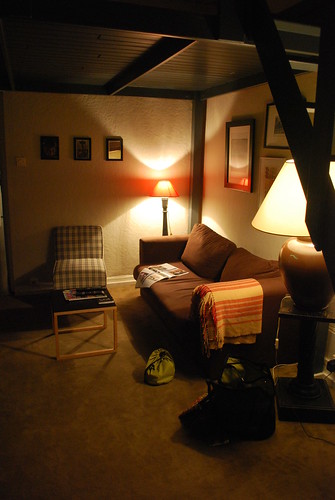
The quirkiest element was something I didn't photograph properly. On the photo below, if you look in the mirror you can see the bedroom, a sleeping platform up a ladder from the main room, above the dark ceiling in the first photo. I could sit up in bed (because I'm short, and short-waisted) but my head brushed the ceiling... (This was all in the photos when I booked)

Hall, with really nice bathroom off it - best shower ever. Really.

Kitchen; sink at other side. Almost seduced by halogen hob. Only almost.

So, there you are; the estate agents' view. Book away; as long as nobody wants to go next time I do, of course. And there will be a next time.
Having picked up the keys from the bar round the corner and cased the joint, I went to the supermarket (found via the Web, just round the corner; baby Auchan). I may have bought too many apéritif-type things. Possibly.
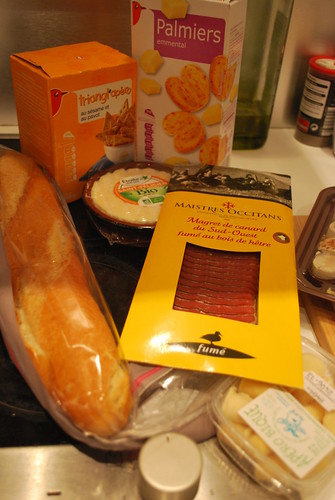
Here we see the extremes of French supermarket apérofromage - the completely synthetic (with plastic stabby things) and the totally artisanale. (Yes, they're goat nipples. Of course they are.) Both excellent in their own way.
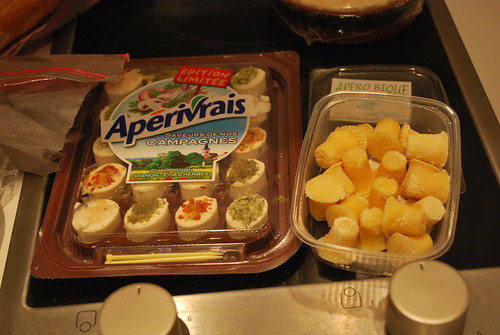
Not having TV at home, and loving the rubbish that passes for TV in France, I was anxious to plug in; before I went to the supermarket, had a very frustrating play with the buttons on the two remotes (multiple remotes fill me with dismay; still can't work out how the ones at my parents' work) but decided I'd better get food first. When I got back and started unpacking into the big armoire in the living room, discovered the small pile of maps and instructions including the ones for the TV. Yay.
I was going to treat myself to a meal out on the first night; but as ever with plane travel, it had taken forever and I was totally and utterly sick of people; so I'd also picked myself up some ready-made taboulé and some merguez; that and crap French TV; lovely.
I last went abroad at the end of 2010 and had a two-day holiday in Luxembourg after a conference; this year, I was sitting in the house on an utterly miserable weekend day at the end of February and decided that was it; I had to go somewhere this year...
A friend had recommended renting a flat; it had never occurred to me that you could rent somewhere for just a few days, but it turns out it was possible. I got mine through this website; the couple running it are lovely...
Not a huge space, but considerably more than a hotel room, and cosy (it was cold when I arrived and the radiator was on):

The quirkiest element was something I didn't photograph properly. On the photo below, if you look in the mirror you can see the bedroom, a sleeping platform up a ladder from the main room, above the dark ceiling in the first photo. I could sit up in bed (because I'm short, and short-waisted) but my head brushed the ceiling... (This was all in the photos when I booked)

Hall, with really nice bathroom off it - best shower ever. Really.

Kitchen; sink at other side. Almost seduced by halogen hob. Only almost.

So, there you are; the estate agents' view. Book away; as long as nobody wants to go next time I do, of course. And there will be a next time.
Having picked up the keys from the bar round the corner and cased the joint, I went to the supermarket (found via the Web, just round the corner; baby Auchan). I may have bought too many apéritif-type things. Possibly.

Here we see the extremes of French supermarket apérofromage - the completely synthetic (with plastic stabby things) and the totally artisanale. (Yes, they're goat nipples. Of course they are.) Both excellent in their own way.

Not having TV at home, and loving the rubbish that passes for TV in France, I was anxious to plug in; before I went to the supermarket, had a very frustrating play with the buttons on the two remotes (multiple remotes fill me with dismay; still can't work out how the ones at my parents' work) but decided I'd better get food first. When I got back and started unpacking into the big armoire in the living room, discovered the small pile of maps and instructions including the ones for the TV. Yay.
I was going to treat myself to a meal out on the first night; but as ever with plane travel, it had taken forever and I was totally and utterly sick of people; so I'd also picked myself up some ready-made taboulé and some merguez; that and crap French TV; lovely.
Wednesday, May 29, 2013
2013 books, #41-45
Fear in the sunlight, by Nicola Upson [audiobook]. Read by Sandra Duncan. Rearsby, Leics.: Clipper, 2012.
Another excellent Josephine Tey novel by Upson, this time largely set in and around Portmeirion and playing on Tey's short relationship wtih Alfred Hitchcock, who adapted her novel A shilling for candles for the screen. All the usual figures in Upson's version of Tey's life are present, and the plot is well up to standard, albeit with the usual number of unlikely coincidences... you don't mind that sort of thing when something rattles along as well as this, though.
Gone girl, by Gillian Flynn. London: Phoenix, 2013.
This is quite astonishing. As far as the plot goes - a guy running a bar in his hometown in Missouri finds out that his wife is missing; it's their fifth wedding anniversary. Very early on, we also find out that he's lying to the police, but we're not sure what about. And really, saying anything more about the plot would be bad in terms of spoilers. If you're not easily upset, read this book. It defies so many of the conventions of a detective story plot and its resolution... I'd love to say a massive amount more about this book, but equally, I don't want to spoil something really quite unusual for anyone else.
Dying fall, by Elly Griffiths. London: Quercus, 2013.
Right up to Elly Griffiths's usual standard. Ruth hears of the death of a college friend, Dan, in a house fire on the same day as she receives a letter from him, saying he's made an important archaeological discovery but is scared; later, she finds that the fire wasn't an accident and that the house was locked from the outside. When she gets an invitation from the department to view the bones, she also starts receiving threatening texts. She wouldn't be Ruth if she didn't head straight into danger, daughter Kate and Cathbad the Druid in tow; unknown to her, Harry Nelson is also on holiday in Lancashire with his family. Excellently plotted with some genuinely scary moments.
Dead scared, by S J Bolton. London: Bantam, 2012.
I've had this for a year; I really should stop buying books because I "keep them for best" rather than reading them when they come in! This was incredibly good and I sort of inhaled it. It's a second book with Lacey Flint and Mark Joesbury, but also features Evi Oliver from another book entirely, and set in Cambridge. A pattern of woman students killing themselves has aroused suspicion, and Lacey is sent undercover as a student called Laura Farrow. Lacey has been told not to investigate, but can't help herself, exasperating Joesbury; she teams up with Evi and very strange things start happening to both of them. This gets Cambridge very right, and it has some absolutely terrifying moments... Brilliant. And I gather there's another one out - only advantage of leaving reading this one very late!
Murder in Belleville, by Cara Black. New York: Soho, 2000.
Tension mounts in Belleville as hunger-strikers protesting about immigration rules come close to death in a local church. Meanwhile, one of Aimée Leduc's friends is almost killed in a car-bombing which murders a mystery woman living under the name Eugénie Grandet (the French equivalent of calling yourself Jane Eyre). Aimée becomes involved in the networks of Algerian nationalists and Islamic fundamentalists, mixing with everyone from government ministers to explosives dealers. As with the previous book, Murder in the Marais, Paris is a character in this book and you can follow the track of the action through Google maps - the events taking place in a primary and nursery school are based on actual schools in that street. (As this is the general area of the school I taught at for a year in the late 1980s, this is very pleasing!) Black's plotting isn't the tightest out there - this is an action thriller rather than a detective puzzle - but it's an immensely enjoyable book.
Another excellent Josephine Tey novel by Upson, this time largely set in and around Portmeirion and playing on Tey's short relationship wtih Alfred Hitchcock, who adapted her novel A shilling for candles for the screen. All the usual figures in Upson's version of Tey's life are present, and the plot is well up to standard, albeit with the usual number of unlikely coincidences... you don't mind that sort of thing when something rattles along as well as this, though.
Gone girl, by Gillian Flynn. London: Phoenix, 2013.
This is quite astonishing. As far as the plot goes - a guy running a bar in his hometown in Missouri finds out that his wife is missing; it's their fifth wedding anniversary. Very early on, we also find out that he's lying to the police, but we're not sure what about. And really, saying anything more about the plot would be bad in terms of spoilers. If you're not easily upset, read this book. It defies so many of the conventions of a detective story plot and its resolution... I'd love to say a massive amount more about this book, but equally, I don't want to spoil something really quite unusual for anyone else.
Dying fall, by Elly Griffiths. London: Quercus, 2013.
Right up to Elly Griffiths's usual standard. Ruth hears of the death of a college friend, Dan, in a house fire on the same day as she receives a letter from him, saying he's made an important archaeological discovery but is scared; later, she finds that the fire wasn't an accident and that the house was locked from the outside. When she gets an invitation from the department to view the bones, she also starts receiving threatening texts. She wouldn't be Ruth if she didn't head straight into danger, daughter Kate and Cathbad the Druid in tow; unknown to her, Harry Nelson is also on holiday in Lancashire with his family. Excellently plotted with some genuinely scary moments.
Dead scared, by S J Bolton. London: Bantam, 2012.
I've had this for a year; I really should stop buying books because I "keep them for best" rather than reading them when they come in! This was incredibly good and I sort of inhaled it. It's a second book with Lacey Flint and Mark Joesbury, but also features Evi Oliver from another book entirely, and set in Cambridge. A pattern of woman students killing themselves has aroused suspicion, and Lacey is sent undercover as a student called Laura Farrow. Lacey has been told not to investigate, but can't help herself, exasperating Joesbury; she teams up with Evi and very strange things start happening to both of them. This gets Cambridge very right, and it has some absolutely terrifying moments... Brilliant. And I gather there's another one out - only advantage of leaving reading this one very late!
Murder in Belleville, by Cara Black. New York: Soho, 2000.
Tension mounts in Belleville as hunger-strikers protesting about immigration rules come close to death in a local church. Meanwhile, one of Aimée Leduc's friends is almost killed in a car-bombing which murders a mystery woman living under the name Eugénie Grandet (the French equivalent of calling yourself Jane Eyre). Aimée becomes involved in the networks of Algerian nationalists and Islamic fundamentalists, mixing with everyone from government ministers to explosives dealers. As with the previous book, Murder in the Marais, Paris is a character in this book and you can follow the track of the action through Google maps - the events taking place in a primary and nursery school are based on actual schools in that street. (As this is the general area of the school I taught at for a year in the late 1980s, this is very pleasing!) Black's plotting isn't the tightest out there - this is an action thriller rather than a detective puzzle - but it's an immensely enjoyable book.
Wednesday, May 08, 2013
2013 books, #36-40
Rubbernecker, by Belinda Bauer [audiobook]. Read by Andrew Wincott. Oxford: Isis, 2013.
A man recovering from a coma thinks he's seen a murder. A student with Asperger's syndrome begins a course in anatomy. A nurse starts an affair with the husband of one of the other coma patients. As well as being a really excellently-plotted thriller, this is also a study in our inability to communicate. In the case of the coma patient, this is a physical thing; in the case of Patrick, the student, a function of his inability to understand people and to make friends. Excellent and very creepy; and well read by Wincott who's best known for being the voice of Adam Macy in The Archers.
The ghost of Lily Painter, by Caitlin Davies [audiobook]. Read by Annie Aldington, Jilly Bond, Mike Grady and Julie Maisey. Oxford: Isis, 2011.
I saw a reference to this when I was looking up the Finchley Baby Farmers while reading Nicola Upton's Two for sorrow earlier in the year, and I'm extremely glad I did. I don't know what the audiobook equivalent of unputdownable is, but I listened to all 10 hours over 2 days; the ensemble reading was excellent and it's an extremely well-crafted story covering four generations of a family and a century of secrets, from the death of Queen Victoria to the present day.
Lost cat: a true story of love, desperation and GPS technology, by Caroline Paul. Illustrated by Wendy MacNaughton. London: Bloomsbury, 2013.
This was lent to me by a lovely colleague who'd borrowed it from Westminster Libraries; and it's a fabulous little book I really wouldn't have come across otherwise. Caroline Paul had a horrible accident, and then while she was recovering, her cat Tibby went missing. Weeks later, Tibby suddenly reappeared, but Caroline was desperate to know where he'd been in the meantime; and this is where the GPS technology, and the insanity, creeps in. This is a lovely little wonder of a book, beautifully and copiously illustrated by Paul's partner Wendy, and containing so much stuff familiar to anyone who's been owned by a cat. Hilarious, sad and joyful all at the same time.
The moon tunnel, by Jim Kelly [audiobook]. Read by Ray Sawyer. Oxford: Isis, 2008.
A body is found in a tunnel near a former World War II internment camp at Ely; but it turns out to date from the 1970s or 1980s. not the 1940s, and the body seems to be heading into the camp, not out. Dryden investigates, and becomes embroiled with the history of the Italian community in the area, which leads to the unveiling of many family secrets. Excellent.
The best of everything, by Rona Jaffe. London: Penguin, 2011. Originally published in 1958.
Rona Jaffe's semi-autobiographical novel is apparently a favourite of Don Draper in Mad men. (Or at least, that's what the reviews say.) Four young women arrive in New York in 1952 to make their way in the world and find themselves working for a slightly downmarket publishing company. Radcliffe graduate Caroline is recovering from a broken engagement, ingenue April is initially stunned by the city, actress Gregg has poise but also fragility, and divorcée Barbara supports her mother and child by writing her beauty column. And then there are men - lecherous men, treacherous men, weak men, overly nice men... The combination of the modernity of some of the women's attitudes and the continuing desperation to "make a good match" are incongruous, and in some cases exasperating. I really enjoyed this book and would recommend it, but neither of the other two at my book group were very keen! (I think this is probably the first book I've read with a pair of legs in tights and high heels on the cover since briefly dipping my toe into the murky water of Jackie Collins as a teenager.)
A man recovering from a coma thinks he's seen a murder. A student with Asperger's syndrome begins a course in anatomy. A nurse starts an affair with the husband of one of the other coma patients. As well as being a really excellently-plotted thriller, this is also a study in our inability to communicate. In the case of the coma patient, this is a physical thing; in the case of Patrick, the student, a function of his inability to understand people and to make friends. Excellent and very creepy; and well read by Wincott who's best known for being the voice of Adam Macy in The Archers.
The ghost of Lily Painter, by Caitlin Davies [audiobook]. Read by Annie Aldington, Jilly Bond, Mike Grady and Julie Maisey. Oxford: Isis, 2011.
I saw a reference to this when I was looking up the Finchley Baby Farmers while reading Nicola Upton's Two for sorrow earlier in the year, and I'm extremely glad I did. I don't know what the audiobook equivalent of unputdownable is, but I listened to all 10 hours over 2 days; the ensemble reading was excellent and it's an extremely well-crafted story covering four generations of a family and a century of secrets, from the death of Queen Victoria to the present day.
Lost cat: a true story of love, desperation and GPS technology, by Caroline Paul. Illustrated by Wendy MacNaughton. London: Bloomsbury, 2013.
This was lent to me by a lovely colleague who'd borrowed it from Westminster Libraries; and it's a fabulous little book I really wouldn't have come across otherwise. Caroline Paul had a horrible accident, and then while she was recovering, her cat Tibby went missing. Weeks later, Tibby suddenly reappeared, but Caroline was desperate to know where he'd been in the meantime; and this is where the GPS technology, and the insanity, creeps in. This is a lovely little wonder of a book, beautifully and copiously illustrated by Paul's partner Wendy, and containing so much stuff familiar to anyone who's been owned by a cat. Hilarious, sad and joyful all at the same time.
The moon tunnel, by Jim Kelly [audiobook]. Read by Ray Sawyer. Oxford: Isis, 2008.
A body is found in a tunnel near a former World War II internment camp at Ely; but it turns out to date from the 1970s or 1980s. not the 1940s, and the body seems to be heading into the camp, not out. Dryden investigates, and becomes embroiled with the history of the Italian community in the area, which leads to the unveiling of many family secrets. Excellent.
The best of everything, by Rona Jaffe. London: Penguin, 2011. Originally published in 1958.
Rona Jaffe's semi-autobiographical novel is apparently a favourite of Don Draper in Mad men. (Or at least, that's what the reviews say.) Four young women arrive in New York in 1952 to make their way in the world and find themselves working for a slightly downmarket publishing company. Radcliffe graduate Caroline is recovering from a broken engagement, ingenue April is initially stunned by the city, actress Gregg has poise but also fragility, and divorcée Barbara supports her mother and child by writing her beauty column. And then there are men - lecherous men, treacherous men, weak men, overly nice men... The combination of the modernity of some of the women's attitudes and the continuing desperation to "make a good match" are incongruous, and in some cases exasperating. I really enjoyed this book and would recommend it, but neither of the other two at my book group were very keen! (I think this is probably the first book I've read with a pair of legs in tights and high heels on the cover since briefly dipping my toe into the murky water of Jackie Collins as a teenager.)
Sunday, April 28, 2013
2013 books, #31-35
Entombed, by Linda Fairstein [audiobook]. Read by Barbara Rosenblat. Rearsby, Leics: WF Howes, 2004.
This was excellent; while Barbara Rosenblat's reading will make the phonebook sound good, this is a really well-written, tight thriller which makes you care about the characters. In this case, attendees at a lawyers' dinner accidentally become privy to the discovery of a walled-in skeleton in a house once inhabited by Edgar Allan Poe. It's a good twisting and turning plot with a lot of info on Poe and his circle. I'll be looking for more in this series.
The man who ate the world: in search of the perfect dinner, by Jay Rayner [audiobook]. Read by the author. Rearsby, Leics.: Clipper/WF Howes, 2008.
Rayner tells the story of how, several years after he became a restaurant critic, a chef told him that Michelin *** restaurants exist only so that the very rich can eat the same food all over the world. Determined to prove the chef wrong, Rayner travels the world to find the perfect meal. We have accounts of restaurants in Las Vegas, Dubai, London, Tokyo and Paris, some truly epic meals, some local colour, a bit of a discussion of the food blogosphere and a lot of very funny commentary. The author's a great reader with very good comic timing, and this is a fun read even if you, like me, will probably never be able to afford to eat in the establishments described...
Valentine Grey, by Sandi Toksvig. London: Virago, 2012.
Valentine Grey hates England in 1897, arriving after an idyllic childhood in India with her father. The only bright spot is her exciting but irresponsible cousin Reggie and his theatrical friends. When a volunteer brigade is created to support the troops in the Boer War, Reggie's father signs him up, to Reggie's horror. Valentine decides to save both of them by dressing in Reggie's uniform and joining the bicycle corps. Both of them find that "freedom" has its price; Reggie's life as a gay man in Victorian London is as confining as the army, and Valentine learns the horror of war. This is an extraordinary book, both moving and very funny, and with genuine anger about both war and prejudice.
One false move, by Harlen Coben. London: Orion, 2004. Originally published 1998.
A Myron Bolitar book; and well up to the usual standard. Myron is conned into looking after rising basketball star Brenda Slaughter, on the basis that he can become her agent. But Brenda's father goes missing, and somehow, someone has links with organised crime. Myron's life, business and relationship are all at risk, and his compulsion to discover the secret just drive him into more trouble.
Raven black, by Anne Cleeves. London: Pan, 2006.
I gather this is the first of the novels on which the recent mini-series Shetland was based; but it's difficult to tell this other than by the name of the detective. A young girl, Catherine Ross, is discovered dead in a snowy field, strangled with her own scarf. There is one obvious suspect, an elderly learning disabled man in the next cottage along, but when the mainland police arrive to investigate they're determined to keep a more open mind than the locals. There's also an echo of the disappearance of young Catriona Bruce years before, and this opens up long-sealed resentments and family secrets. I really didn't see the dénouement of this book coming! I'll definitely be reading the others in this series and Cleeves's other books.
The man who ate the world: in search of the perfect dinner, by Jay Rayner [audiobook]. Read by the author. Rearsby, Leics.: Clipper/WF Howes, 2008.
Rayner tells the story of how, several years after he became a restaurant critic, a chef told him that Michelin *** restaurants exist only so that the very rich can eat the same food all over the world. Determined to prove the chef wrong, Rayner travels the world to find the perfect meal. We have accounts of restaurants in Las Vegas, Dubai, London, Tokyo and Paris, some truly epic meals, some local colour, a bit of a discussion of the food blogosphere and a lot of very funny commentary. The author's a great reader with very good comic timing, and this is a fun read even if you, like me, will probably never be able to afford to eat in the establishments described...
Valentine Grey, by Sandi Toksvig. London: Virago, 2012.
Valentine Grey hates England in 1897, arriving after an idyllic childhood in India with her father. The only bright spot is her exciting but irresponsible cousin Reggie and his theatrical friends. When a volunteer brigade is created to support the troops in the Boer War, Reggie's father signs him up, to Reggie's horror. Valentine decides to save both of them by dressing in Reggie's uniform and joining the bicycle corps. Both of them find that "freedom" has its price; Reggie's life as a gay man in Victorian London is as confining as the army, and Valentine learns the horror of war. This is an extraordinary book, both moving and very funny, and with genuine anger about both war and prejudice.
One false move, by Harlen Coben. London: Orion, 2004. Originally published 1998.
A Myron Bolitar book; and well up to the usual standard. Myron is conned into looking after rising basketball star Brenda Slaughter, on the basis that he can become her agent. But Brenda's father goes missing, and somehow, someone has links with organised crime. Myron's life, business and relationship are all at risk, and his compulsion to discover the secret just drive him into more trouble.
Raven black, by Anne Cleeves. London: Pan, 2006.
I gather this is the first of the novels on which the recent mini-series Shetland was based; but it's difficult to tell this other than by the name of the detective. A young girl, Catherine Ross, is discovered dead in a snowy field, strangled with her own scarf. There is one obvious suspect, an elderly learning disabled man in the next cottage along, but when the mainland police arrive to investigate they're determined to keep a more open mind than the locals. There's also an echo of the disappearance of young Catriona Bruce years before, and this opens up long-sealed resentments and family secrets. I really didn't see the dénouement of this book coming! I'll definitely be reading the others in this series and Cleeves's other books.
Wednesday, April 10, 2013
2013 books, #26-30
Legal briefs: stories by today's best thriller writers. Edited by William Bernhardt. London: Headline, 1998.
I'm never sure how I feel about short stories - I love Saki, and de Maupassant, but they're meant to be the best of the bunch, I think... Anyway, very often I'll get halfway through a collection of short stories and sort of run out energy, and about a year ago I did that with this collection, so my memory of all of them isn't that great. However... Steve Martini's story, Poetic justice, made me cringe slightly with its doggerel/prose/folksy quality although I really enjoy his novels. John Grisham contributes a three-page story which just rips you apart with its pathos; quite stunning. Michael A. Kahn's contribution gives you an idea of how law just might be practised in Cook County; Philip M. Margolin plays on the inaccuracy of eye-witnesses, and Jeremiah Healy sets up an excellent twist in the tail, before bottling it slightly at the end. Philip Friedman tells a bleak little tale of a lawyer heading cross country into his past, before Lisa Scottoline rounds up the collection with a somewhat hilarious re-take on "take your daughter to work" day; said daughter being three months old and father being a hapless and sleep-deprived new father of twins. Definitely worth getting hold of.
The daughter of time, by Josephine Tey. London: Folio Society, 2006. First published 1951.
This was my suggestion for book group this time round. I'm not sure it made for great discussion, but it was very interesting to read it again in the light of the discovery of Richard III's bones under a Leicester car park, and part of the reason for getting the Nicola Upson (last set of book reviews) out of the library was the Tey connection. I treated myself to a Folio edition to replace my battered paperback when I found it in the lovely Oxfam bookshop in Saffron Walden a year or two ago, and the introduction by Alison Weir is worth the £4 or so I paid. Weir points out, without actually using the phrase, that this is really the first "cold case" detective novel. There are elements in some of the Wimsey stories, I suppose; but this is the first where the protagonists, as very often, are dead, where the eyewitnesses are not only more-than-usually unreliable but also long dead, and where politics and propaganda blur the scene. Weir also probes the holes in Tey's defence of Richard III; some of them caused by accounts being discovered/published only later; some caused by an over-zealous wish to set the record straight. In discussion, we were all slightly boggled by the very luxurious NHS of the past. I think I need to go back and read the other Alan Grant novels again though...
The debt to pleasure, by John Lanchester. London: Picador, 1996.
This is a wonderful, funny, sinister little book. Tarquin Winot, epicure and dreadful snob, sets out to produce a culinary year through menus while travelling from Portsmouth to the Provençal town of Ste-Eulalie. As the book progresses though, you realise that there's more going on - why is he carrying the Mossad manual of surveillance techniques? why has he shaved his head? Tarquin is a splendid, monstrous character, and the slow reveal of this book makes it unputdownable, to the extent that I suddenly realised I'd gone past my Tube stop on one occasion...
The casual vacancy, by J K Rowling [audiobook]. Read by Tom Hollander. Oxford: Isis, 2012.
This was great. I'd started reading the book, but had to take it back to the library because someone else needed it, and then I found out who was reading the audiobook... I really enjoyed this. No, it wasn't Harry Potter (which seems to have been the main criticism) but it had a seething, lively bunch of characters who reflect life in a small town pretty well. At first I thought they were going to be caricatures; but as it develops, the main characters become three-dimensional and there's a huge amount of authorial sympathy for the most alienated and powerless. If this is what Rowling is going to do in future, I'm all for it... Hollander's reading is absolutely excellent, as I'd hoped.
Beekeeping for beginners, by Laurie R. King. Kindle edition.
Background to the first Holmes/Russell novel, The beekeeper's apprentice. How Holmes and Russell inadvertently saved each other's lives. Lovely little vignette which turned up as a very cheap read on Kindle. I wondered at the end whether it was a duplication of something in A study in Sherlock which King edits and which is sitting on my to-read pile, but it turns out not, happily. If you're a Holmes/Russell fan, this is definitely worth getting hold of...
I'm never sure how I feel about short stories - I love Saki, and de Maupassant, but they're meant to be the best of the bunch, I think... Anyway, very often I'll get halfway through a collection of short stories and sort of run out energy, and about a year ago I did that with this collection, so my memory of all of them isn't that great. However... Steve Martini's story, Poetic justice, made me cringe slightly with its doggerel/prose/folksy quality although I really enjoy his novels. John Grisham contributes a three-page story which just rips you apart with its pathos; quite stunning. Michael A. Kahn's contribution gives you an idea of how law just might be practised in Cook County; Philip M. Margolin plays on the inaccuracy of eye-witnesses, and Jeremiah Healy sets up an excellent twist in the tail, before bottling it slightly at the end. Philip Friedman tells a bleak little tale of a lawyer heading cross country into his past, before Lisa Scottoline rounds up the collection with a somewhat hilarious re-take on "take your daughter to work" day; said daughter being three months old and father being a hapless and sleep-deprived new father of twins. Definitely worth getting hold of.
The daughter of time, by Josephine Tey. London: Folio Society, 2006. First published 1951.
This was my suggestion for book group this time round. I'm not sure it made for great discussion, but it was very interesting to read it again in the light of the discovery of Richard III's bones under a Leicester car park, and part of the reason for getting the Nicola Upson (last set of book reviews) out of the library was the Tey connection. I treated myself to a Folio edition to replace my battered paperback when I found it in the lovely Oxfam bookshop in Saffron Walden a year or two ago, and the introduction by Alison Weir is worth the £4 or so I paid. Weir points out, without actually using the phrase, that this is really the first "cold case" detective novel. There are elements in some of the Wimsey stories, I suppose; but this is the first where the protagonists, as very often, are dead, where the eyewitnesses are not only more-than-usually unreliable but also long dead, and where politics and propaganda blur the scene. Weir also probes the holes in Tey's defence of Richard III; some of them caused by accounts being discovered/published only later; some caused by an over-zealous wish to set the record straight. In discussion, we were all slightly boggled by the very luxurious NHS of the past. I think I need to go back and read the other Alan Grant novels again though...
The debt to pleasure, by John Lanchester. London: Picador, 1996.
This is a wonderful, funny, sinister little book. Tarquin Winot, epicure and dreadful snob, sets out to produce a culinary year through menus while travelling from Portsmouth to the Provençal town of Ste-Eulalie. As the book progresses though, you realise that there's more going on - why is he carrying the Mossad manual of surveillance techniques? why has he shaved his head? Tarquin is a splendid, monstrous character, and the slow reveal of this book makes it unputdownable, to the extent that I suddenly realised I'd gone past my Tube stop on one occasion...
The casual vacancy, by J K Rowling [audiobook]. Read by Tom Hollander. Oxford: Isis, 2012.
This was great. I'd started reading the book, but had to take it back to the library because someone else needed it, and then I found out who was reading the audiobook... I really enjoyed this. No, it wasn't Harry Potter (which seems to have been the main criticism) but it had a seething, lively bunch of characters who reflect life in a small town pretty well. At first I thought they were going to be caricatures; but as it develops, the main characters become three-dimensional and there's a huge amount of authorial sympathy for the most alienated and powerless. If this is what Rowling is going to do in future, I'm all for it... Hollander's reading is absolutely excellent, as I'd hoped.
Beekeeping for beginners, by Laurie R. King. Kindle edition.
Background to the first Holmes/Russell novel, The beekeeper's apprentice. How Holmes and Russell inadvertently saved each other's lives. Lovely little vignette which turned up as a very cheap read on Kindle. I wondered at the end whether it was a duplication of something in A study in Sherlock which King edits and which is sitting on my to-read pile, but it turns out not, happily. If you're a Holmes/Russell fan, this is definitely worth getting hold of...
Sunday, March 31, 2013
2013 books, #21-25
The racketeer, by John Grisham. London: Hodder and Stoughton, 2012.
This is quite a departure from Grisham. His main character, Malcolm Bannister, is a lawyer, but one in prison for money-laundering. When a federal judge is murdered at his holiday cottage, Bannister knows who killed him, and why, and uses the information to negotiate his release. From then on, though, the story becomes somewhat strange, and for a couple of hundred pages you (well, I) have no clue what's going on, until a final meeting of people involved in a very complicated plot. I've always found some of Grisham's endings slightly disappointing, and sadly, after a terrific roller-coaster, this one is, too; I'm also pretty sure I don't like the main character by the end, too, which is a new one for a Grisham protagonist. Definitely worth a read though!
Two for sorrow, by Nicola Upson [audiobook]. Read by Sandra Duncan. Rearsby, Leics.: Clipper, 2010.
Josephine Tey is the protagonist in this third period novel by Upson; she comes to London to research a novel she's writing based on the Finchley baby farmers, having become interested in the topic as a student, when the daughter of one of the executed women committed suicide on learning of her mother's crime. Unfortunately, the crimes of 1902 are still capable of reaching forward into the 1930s, and it's in someone's interest to make sure that Tey never completes her investigations. Very nicely paced, with a slow realisation of the criminal's identity at the end.
Heaven's prisoners, by James Lee Burke. London: Orion, 2012. Originally published 1990.
The second of the Dave Robicheaux novels, and one I raced through in a couple of sittings. Robicheaux has left the New Orleans police and settled down with his new wife to run a bait shop and boat hire business on the bayou. It should be idyllic, but one day a small plane carrying five passengers bursts into flames and comes down into the bayou near Dave and Annie's boat. They save one passenger, a small girl, but the other four are already dead. The next day, they are told that there were only three passengers on the boat. Robicheaux can't help investigating, despite pleas from Annie to leave the situation alone, and the results are terrible. I read this book to a soundtrack of alternating zydeco and Mountain Goats and that definitely worked.
Military blunders, by Saul David. Kindle edition.
I found this this after listening to an interview with Saul David on the BBC History Magazine podcast, and before I watched a couple of episodes of his Bullets, boots and bandages series on iPlayer recently. I know next to nothing about military history, but David's very commonsense divisions (Bad commanders, Lack of preparation, Meddling politicians, Misplaced confidence and Failure to perform) probably apply to any situation, and it made the examples he gives easier to understand. This is a very clear and cogent explanation of some reasons why military operations go horribly wrong, with some humour and the odd informative anecdote (the US term "hooker" for a prostitute came from a US general of that name who was inordinately keen on encouraging camp-followers, for instance). I wouldn't have read this if it hadn't been free/extremely cheap on Kindle (only way I buy ebooks), although my enjoyment of the book would have been enhanced by the maps of battlefields and formations being at all legible...
The blackhouse, by Peter May [audiobook]. Read by Steve Worsley. Oxford: Isis, 2011.
Excellent thriller set in the Western Isles. Fin Macleod is sent north from Edinburgh to investigate two murders with similar MOs, one in Edinburgh, one on the Isle of Lewis; as well as being the CIO on the case, he's also a Lewis native. Coming back to Lewis for the first time in 18 years, immediately after the loss of a child, he's forced to face his past and fill in the fractured memories of a rite of passage at An Sgeir, a rock housing nesting gannets the Lewismen are permitted to slaughter. The reading is lovely here, too - Steve Worsley has a combination of Scottishness and clarity reminiscent of David Tennant.
This is quite a departure from Grisham. His main character, Malcolm Bannister, is a lawyer, but one in prison for money-laundering. When a federal judge is murdered at his holiday cottage, Bannister knows who killed him, and why, and uses the information to negotiate his release. From then on, though, the story becomes somewhat strange, and for a couple of hundred pages you (well, I) have no clue what's going on, until a final meeting of people involved in a very complicated plot. I've always found some of Grisham's endings slightly disappointing, and sadly, after a terrific roller-coaster, this one is, too; I'm also pretty sure I don't like the main character by the end, too, which is a new one for a Grisham protagonist. Definitely worth a read though!
Two for sorrow, by Nicola Upson [audiobook]. Read by Sandra Duncan. Rearsby, Leics.: Clipper, 2010.
Josephine Tey is the protagonist in this third period novel by Upson; she comes to London to research a novel she's writing based on the Finchley baby farmers, having become interested in the topic as a student, when the daughter of one of the executed women committed suicide on learning of her mother's crime. Unfortunately, the crimes of 1902 are still capable of reaching forward into the 1930s, and it's in someone's interest to make sure that Tey never completes her investigations. Very nicely paced, with a slow realisation of the criminal's identity at the end.
Heaven's prisoners, by James Lee Burke. London: Orion, 2012. Originally published 1990.
The second of the Dave Robicheaux novels, and one I raced through in a couple of sittings. Robicheaux has left the New Orleans police and settled down with his new wife to run a bait shop and boat hire business on the bayou. It should be idyllic, but one day a small plane carrying five passengers bursts into flames and comes down into the bayou near Dave and Annie's boat. They save one passenger, a small girl, but the other four are already dead. The next day, they are told that there were only three passengers on the boat. Robicheaux can't help investigating, despite pleas from Annie to leave the situation alone, and the results are terrible. I read this book to a soundtrack of alternating zydeco and Mountain Goats and that definitely worked.
Military blunders, by Saul David. Kindle edition.
I found this this after listening to an interview with Saul David on the BBC History Magazine podcast, and before I watched a couple of episodes of his Bullets, boots and bandages series on iPlayer recently. I know next to nothing about military history, but David's very commonsense divisions (Bad commanders, Lack of preparation, Meddling politicians, Misplaced confidence and Failure to perform) probably apply to any situation, and it made the examples he gives easier to understand. This is a very clear and cogent explanation of some reasons why military operations go horribly wrong, with some humour and the odd informative anecdote (the US term "hooker" for a prostitute came from a US general of that name who was inordinately keen on encouraging camp-followers, for instance). I wouldn't have read this if it hadn't been free/extremely cheap on Kindle (only way I buy ebooks), although my enjoyment of the book would have been enhanced by the maps of battlefields and formations being at all legible...
The blackhouse, by Peter May [audiobook]. Read by Steve Worsley. Oxford: Isis, 2011.
Excellent thriller set in the Western Isles. Fin Macleod is sent north from Edinburgh to investigate two murders with similar MOs, one in Edinburgh, one on the Isle of Lewis; as well as being the CIO on the case, he's also a Lewis native. Coming back to Lewis for the first time in 18 years, immediately after the loss of a child, he's forced to face his past and fill in the fractured memories of a rite of passage at An Sgeir, a rock housing nesting gannets the Lewismen are permitted to slaughter. The reading is lovely here, too - Steve Worsley has a combination of Scottishness and clarity reminiscent of David Tennant.
Monday, March 18, 2013
2013 books, #16-20
The last witness, by Joel Goldman. Part of the Dead times four anthology, available for the Kindle.
Wilson "Blues" Bluestone, ex-cop, blues-bar-owner and friend of Lou Mason, is arrested for the murder of prominent local politician Jack Cullan. It's pretty obvious that there's no real will to go looking for another suspect, so Mason realises he'll have to track down the truth himself. Even Blues's ex-partner Harry is convinced to Blues's guilt. Lou enters the world of dirty politics, dirty law-enforcement and dirty justice to try to dig down to the truth.
Cold truth, by Joel Goldman. Part of the Dead times four anthology, available for the Kindle.
A talk-show psychotherapist is thrown out of a 6th-floor window in the Kansas City business district. The obvious suspect is Jordan Hackett, disturbed daughter of the radio-station's owners; and as ever, Lou Mason is engaged as the lawyer in a seemingly hopeless situation. Jordan herself isn't the most helpful of clients, particularly when she confesses to the murder and then recants. This is a wonderfully complex story with lots of action scenes, and a bit of romance; perfect roller-coaster entertainment with some interesting social points thoughtfully made.
Deadlocked, by Joel Goldman. Part of the Dead times four anthology, available for the Kindle.
Wilson "Blues" Bluestone, ex-cop, blues-bar-owner and friend of Lou Mason, is arrested for the murder of prominent local politician Jack Cullan. It's pretty obvious that there's no real will to go looking for another suspect, so Mason realises he'll have to track down the truth himself. Even Blues's ex-partner Harry is convinced to Blues's guilt. Lou enters the world of dirty politics, dirty law-enforcement and dirty justice to try to dig down to the truth.
Cold truth, by Joel Goldman. Part of the Dead times four anthology, available for the Kindle.
A talk-show psychotherapist is thrown out of a 6th-floor window in the Kansas City business district. The obvious suspect is Jordan Hackett, disturbed daughter of the radio-station's owners; and as ever, Lou Mason is engaged as the lawyer in a seemingly hopeless situation. Jordan herself isn't the most helpful of clients, particularly when she confesses to the murder and then recants. This is a wonderfully complex story with lots of action scenes, and a bit of romance; perfect roller-coaster entertainment with some interesting social points thoughtfully made.
Deadlocked, by Joel Goldman. Part of the Dead times four anthology, available for the Kindle.
Lou Mason witnesses an execution by virtue of giving an old friend, the arresting officer in the case, a lift to the jail. After the execution, both the mother of the executed man and the son of his two victims ask Mason to sue the other co-defendant, a man acquitted of the crimes, who is now a prominent local businessman. Mason puts his relationship and his life on the end to try and determine the truth. I'm very sad that there only seem to be four of these novels as Mason's an engaging character and this series could run further; with any luck, the Kindle anthology might prove successful enough for the author to write another one.
Capital, by John Lanchester. Kindle edition.
The inhabitants of Pepys Road are surprised by the launching of a campaign of postcards featuring the front doors of their houses with the message "We Want What You Have". As each card arrives, we find a little more about the people and lives in this largely-gentrified London street; the old lady who was born in the house she lives in (and her Banksyesque grandson), the nouveau riches, the banking couple with the nanny, the Polish builder, the Asian corner shop owners and the young footballer from Senegal, his father and his agent, the Zimbabwean traffic warden who walks the street... Every situation has its interesting points and there's an intertwining of people's lives. The panoramic scope of the novel means that there's sometimes a lack of depth, but it's a fascinating read for all that.
Bad pharma, by Ben Goldacre [audiobook]. Read by Jot Davies. Rearsby, Leics.: Clipper, 2012.
A fascinating and very scary discussion of the pharmaceutical industry from the point of view of doctor and investigative writer Goldacre, which explains the testing procedure, publishing tendencies and modus operandi of the industry, and why the newest, shiniest drug is very often far from being the best one. It's explained in language that anyone reasonably intelligent can understand, even without any prior knowledge of the drugs and conditions involved, without being patronising. Must find out what else he's written.
Sunday, March 03, 2013
2013 books, #11-15
Seems to be taking longer than usual to get through books; but it's been a ridiculous couple of weeks.
The water clock, by Jim Kelly [audiobook]. Read by Ray Sawyer. Isis: Oxford, 2002.
The first of Jim Kelly's Philip Dryden books and an excellent one. Even if reading a book set in snowy Fens while sitting in said snowy Fens with a dodgy boiler is a bit of a mixed pleasure. A body is found frozen in a car which has driven into a drain; sadly, not that uncommon in the Fens in the winter, but it's less common to find the body in the car boot. Later, a second, much older body is found on the roof of Ely Cathedral. Local reporter Philip Dryden investigates and personal and historical events interlock. I love the geographical accuracy of these books - there are very few inventions, and when there are, they make sense. Nice reading by Ray Sawyer.
How I won the yellow jumper: dispatches from the Tour de France, by Ned Boulting. London: Yellow Jersey Press, 2011.
As a neophyte to the Tour de France in 2010 (I came in via the Tour de Fleece, a parallel spinning event where we spin our wheels in time to the cyclists'), I had no idea about the teams, and the green jersey, and the King of the Mountains, and that it was a team event. I'm a total Francophile so I was mainly there for the scenery, to be honest... But as someone who's naturally a bit of a geek (my other sport is cricket which I've been following for years, and I like my rules complicated), the whole complexity of the thing really got me involved. Ned Boulting was my guide, effortlessly providing information about the teams, the gradients, the politics... I had no idea he'd arrived in 2003 from football, with no more idea than I had seven years later. If you've seen Ned Boulting in action, the book is as funny, charming, articulate and irreverent as you'd expect (review on the cover "Quirky, warped, enthusiastic and funny": Chris Boardman), and packed with a huge amount of information. It was published before the 2011 Tour, so some elements are strangely dated now (Wiggins just a contender who hadn't really made his mark again in 2010 after a good 2009, Lance Armstrong highly suspect but as yet undisgraced). Even if you've no interest in cycling, if you love good writing from a fan of just about anything, I suspect you'll be pulled in and enchanted by this book. I raced through it (sorry), and am slightly sad about that; I sort of have a compulsion to read it all again, as it was too good to put down.
The vanishing point, by Val McDermid. London: Little, Brown, 2012.
This is a strange one; but very, very good. A little boy is kidnapped at a US airport within sight of his carer Stephanie; most of the narrative happens in a small interrogation room at the airport as the FBI attempt to discover what has happened. It's really difficult to say what else happens without spoiling, but it involves Stephanie, a ghost writer, getting involved with a reality TV star whose career mirrors Jade Goody's, and the spiral her life enters. I'm really not sure what I feel about the ending, and would love anyone else who's read this to let me know; McDermid drops you down a Deaver-sized hole a couple of times in the course of this book, and I'm not completely convinced it all works; but blimey, it's a good read.
A blink of the screen: collected shorter fiction, by Terry Pratchett [audiobook]. Read by Michael Fenton Stevens and Stephen Briggs. Oxford: Isis, 2012.
The first weird thing about this collection is the introduction by AS Byatt; not necessarily your typical Pratchett anorak (and I used this advisedly given that she re-reads copiously), which is, of course, why she's doing the introduction. This is a pretty tremendous collection; particularly given that stories written for the school magazine get their turn among later work, and stand up pretty well, considering. It's the same intelligence and sense of the absurd at work over more than 40 years, and there are so many themes which are developed later... I think the absolute stand-out story for me is one of the Discworld-related ones, The Sea and Little Fishes. If you're a fan of Granny/Mistress Weatherwax's headology (and I so very much am) this is an absolute must. There's also an out-take from the story, which is chilling, given separately at the end of the book. There's also a very excellent committee-related one called A Collegiate Casting-out of Devilish Devices, which anyone who's been on a committee, or within earshot of teachers, will recognise entirely. There are also wonderful pieces of whimsy like Lord Vetinari's speech at the official twinning ceremony between Ankh-Morpork and Wincanton, and the Ankh-Morpork National Anthem (unofficially on YouTube; as Pratchett comments, there are scallywags out there on the Internet...lyrics in the commentary afterwards.)
Motion to kill, by Joel Goldman. Part of the Dead times four anthology, available for the Kindle.
I gather these were also available in paperback at one time and may still be. I got this anthology for Kindle for something ridiculous like free, or £0.70 - but for four really good books, the £6.50 Kindle now want for it is well worth the money. If you like Harlan Coben's Myron Bolitar books, you'll adore these. There's some of the same element (Jewish professional drawn into detection, network of supporters, funny elements, awkward romance) and the plots are excellent. I'm going to give a brief note on each separately though, as there are actually four full-length novels here!
In Motion to kill, Lou Mason has moved to a corporate law firm in Kansas City from a small personal-injury firm, to the disgust of his campaigning leftie aunt who brought him up. Unfortunately, his partners seem to be dropping like flies, and there's a limit to the police's interest. Mason starts investigating and becomes ever more aware of the cesspit under his law firm. Lots of twists and turns, and quite a surprising ending.
The water clock, by Jim Kelly [audiobook]. Read by Ray Sawyer. Isis: Oxford, 2002.
The first of Jim Kelly's Philip Dryden books and an excellent one. Even if reading a book set in snowy Fens while sitting in said snowy Fens with a dodgy boiler is a bit of a mixed pleasure. A body is found frozen in a car which has driven into a drain; sadly, not that uncommon in the Fens in the winter, but it's less common to find the body in the car boot. Later, a second, much older body is found on the roof of Ely Cathedral. Local reporter Philip Dryden investigates and personal and historical events interlock. I love the geographical accuracy of these books - there are very few inventions, and when there are, they make sense. Nice reading by Ray Sawyer.
How I won the yellow jumper: dispatches from the Tour de France, by Ned Boulting. London: Yellow Jersey Press, 2011.
As a neophyte to the Tour de France in 2010 (I came in via the Tour de Fleece, a parallel spinning event where we spin our wheels in time to the cyclists'), I had no idea about the teams, and the green jersey, and the King of the Mountains, and that it was a team event. I'm a total Francophile so I was mainly there for the scenery, to be honest... But as someone who's naturally a bit of a geek (my other sport is cricket which I've been following for years, and I like my rules complicated), the whole complexity of the thing really got me involved. Ned Boulting was my guide, effortlessly providing information about the teams, the gradients, the politics... I had no idea he'd arrived in 2003 from football, with no more idea than I had seven years later. If you've seen Ned Boulting in action, the book is as funny, charming, articulate and irreverent as you'd expect (review on the cover "Quirky, warped, enthusiastic and funny": Chris Boardman), and packed with a huge amount of information. It was published before the 2011 Tour, so some elements are strangely dated now (Wiggins just a contender who hadn't really made his mark again in 2010 after a good 2009, Lance Armstrong highly suspect but as yet undisgraced). Even if you've no interest in cycling, if you love good writing from a fan of just about anything, I suspect you'll be pulled in and enchanted by this book. I raced through it (sorry), and am slightly sad about that; I sort of have a compulsion to read it all again, as it was too good to put down.
The vanishing point, by Val McDermid. London: Little, Brown, 2012.
This is a strange one; but very, very good. A little boy is kidnapped at a US airport within sight of his carer Stephanie; most of the narrative happens in a small interrogation room at the airport as the FBI attempt to discover what has happened. It's really difficult to say what else happens without spoiling, but it involves Stephanie, a ghost writer, getting involved with a reality TV star whose career mirrors Jade Goody's, and the spiral her life enters. I'm really not sure what I feel about the ending, and would love anyone else who's read this to let me know; McDermid drops you down a Deaver-sized hole a couple of times in the course of this book, and I'm not completely convinced it all works; but blimey, it's a good read.
A blink of the screen: collected shorter fiction, by Terry Pratchett [audiobook]. Read by Michael Fenton Stevens and Stephen Briggs. Oxford: Isis, 2012.
The first weird thing about this collection is the introduction by AS Byatt; not necessarily your typical Pratchett anorak (and I used this advisedly given that she re-reads copiously), which is, of course, why she's doing the introduction. This is a pretty tremendous collection; particularly given that stories written for the school magazine get their turn among later work, and stand up pretty well, considering. It's the same intelligence and sense of the absurd at work over more than 40 years, and there are so many themes which are developed later... I think the absolute stand-out story for me is one of the Discworld-related ones, The Sea and Little Fishes. If you're a fan of Granny/Mistress Weatherwax's headology (and I so very much am) this is an absolute must. There's also an out-take from the story, which is chilling, given separately at the end of the book. There's also a very excellent committee-related one called A Collegiate Casting-out of Devilish Devices, which anyone who's been on a committee, or within earshot of teachers, will recognise entirely. There are also wonderful pieces of whimsy like Lord Vetinari's speech at the official twinning ceremony between Ankh-Morpork and Wincanton, and the Ankh-Morpork National Anthem (unofficially on YouTube; as Pratchett comments, there are scallywags out there on the Internet...lyrics in the commentary afterwards.)
Motion to kill, by Joel Goldman. Part of the Dead times four anthology, available for the Kindle.
I gather these were also available in paperback at one time and may still be. I got this anthology for Kindle for something ridiculous like free, or £0.70 - but for four really good books, the £6.50 Kindle now want for it is well worth the money. If you like Harlan Coben's Myron Bolitar books, you'll adore these. There's some of the same element (Jewish professional drawn into detection, network of supporters, funny elements, awkward romance) and the plots are excellent. I'm going to give a brief note on each separately though, as there are actually four full-length novels here!
In Motion to kill, Lou Mason has moved to a corporate law firm in Kansas City from a small personal-injury firm, to the disgust of his campaigning leftie aunt who brought him up. Unfortunately, his partners seem to be dropping like flies, and there's a limit to the police's interest. Mason starts investigating and becomes ever more aware of the cesspit under his law firm. Lots of twists and turns, and quite a surprising ending.
Sunday, February 10, 2013
2013 books, #6-10
Mrs Robinson's disgrace: the private diary of a Victorian lady, by Kate Summerscale [audiobook]. Read by Jenny Agutter. Bath: AudioGO, 2012.
Sometimes the Victorians seem just like us. This was not one of those times... Isabella Robinson meets Edward Lane at an Edinburgh society party in 1850, and becomes enchanted by his appearance and conversation. Unfortunately, Isabella is married, and Edward is ten years her junior. Their relationship develops, and is discovered by means of Mr Robinson finding Isabella's diaries where glowing details are given. This is a fascinating exploration of Victorian manners, of the power of husbands in the era, and of the divorce courts in 1850s England, well before the Married Women's Property Act, based on the documentary evidence in the case.
Nightwoods, by Charles Frazier. London: Sceptre, 2012.
Luce's new stranger children were small and beautiful and violent. Luce has been presented with her dead sister's children by social services; they are traumatised and terrified, violent and angry; they communicate by means of destruction and fire. Luce is no stranger to trauma and violence, and does her best to build a relationship with the children; but two strangers are heading for her isolated farmhouse, one the grandson of the previous owner, the other the murderer of Luce's sister seeking money and the children. This is a dark, haunting story set in the North Carolina woods; one which will stay in the memory for a long time.
Cold wind, by C J Box. London: Corvus, 2012.
Earl Alden, the Earl of Lexington and Joe Pickett's current father-in-law, is found spinning around at the end of one of his own multi-million dollar wind turbines; Joe's mother-in-law is arrested for the murder by the local police. Her behaviour gives no indication as to whether she's guilty or not, and while Joe can't stand her, he does love his wife so starts some investigations of his own. Meanwhile, Nate Romanowski, usually an ally, has troubles and grief of his own. The plot in this one twists and turns nicely, and Joe's essential likeability always carries these books through.
Death's acre: inside the legendary Body Farm, by Bill Bass and Jon Jefferson. London: Time Warner, 2003.
Essentially, this is Bill Bass's autobiography; we find out about his life and career, but because so much of his life has been engaged in the study of decomposition and forensic anthropology, there's a lot of that too, and it's also a biography of the site in Tennessee which is home to his research facility. There's some humour here, quite a lot of well-explained science, and some (not unexpected) very close parallels with Bill Brockton, the lead character in the Jefferson Bass books. An engaging non-fiction read.
Tripwire, by Lee Child [audiobook]. Read by Garrick Hagon. Whitley Bay: Soundings, 2001.
This was originally written in 1990; had to check this as the dénouement is set on the 89th floor of one of the World Grade Center towers... The second of the Jack Reacher novels, and another excellent one. Reacher is tracked down by a private detective who is subsequently found dead; he follows the detective's trail back to his client who turns out to be an old friend. Carrying on the old friend's enquiries into a soldier listed as MIA in Vietnam leads Reacher into a web of list and confusion, and a rather unexpected conclusion. Child is skilful enough to create a villain who is truly evil, but then gives you a small window into his tortured world; this sort of little twist always lifts his writing above the ordinary. While I always prefer Jeff Harding reading these books, Garrick Hagon does his usual excellent job.
Sometimes the Victorians seem just like us. This was not one of those times... Isabella Robinson meets Edward Lane at an Edinburgh society party in 1850, and becomes enchanted by his appearance and conversation. Unfortunately, Isabella is married, and Edward is ten years her junior. Their relationship develops, and is discovered by means of Mr Robinson finding Isabella's diaries where glowing details are given. This is a fascinating exploration of Victorian manners, of the power of husbands in the era, and of the divorce courts in 1850s England, well before the Married Women's Property Act, based on the documentary evidence in the case.
Nightwoods, by Charles Frazier. London: Sceptre, 2012.
Luce's new stranger children were small and beautiful and violent. Luce has been presented with her dead sister's children by social services; they are traumatised and terrified, violent and angry; they communicate by means of destruction and fire. Luce is no stranger to trauma and violence, and does her best to build a relationship with the children; but two strangers are heading for her isolated farmhouse, one the grandson of the previous owner, the other the murderer of Luce's sister seeking money and the children. This is a dark, haunting story set in the North Carolina woods; one which will stay in the memory for a long time.
Cold wind, by C J Box. London: Corvus, 2012.
Earl Alden, the Earl of Lexington and Joe Pickett's current father-in-law, is found spinning around at the end of one of his own multi-million dollar wind turbines; Joe's mother-in-law is arrested for the murder by the local police. Her behaviour gives no indication as to whether she's guilty or not, and while Joe can't stand her, he does love his wife so starts some investigations of his own. Meanwhile, Nate Romanowski, usually an ally, has troubles and grief of his own. The plot in this one twists and turns nicely, and Joe's essential likeability always carries these books through.
Death's acre: inside the legendary Body Farm, by Bill Bass and Jon Jefferson. London: Time Warner, 2003.
Essentially, this is Bill Bass's autobiography; we find out about his life and career, but because so much of his life has been engaged in the study of decomposition and forensic anthropology, there's a lot of that too, and it's also a biography of the site in Tennessee which is home to his research facility. There's some humour here, quite a lot of well-explained science, and some (not unexpected) very close parallels with Bill Brockton, the lead character in the Jefferson Bass books. An engaging non-fiction read.
Tripwire, by Lee Child [audiobook]. Read by Garrick Hagon. Whitley Bay: Soundings, 2001.
This was originally written in 1990; had to check this as the dénouement is set on the 89th floor of one of the World Grade Center towers... The second of the Jack Reacher novels, and another excellent one. Reacher is tracked down by a private detective who is subsequently found dead; he follows the detective's trail back to his client who turns out to be an old friend. Carrying on the old friend's enquiries into a soldier listed as MIA in Vietnam leads Reacher into a web of list and confusion, and a rather unexpected conclusion. Child is skilful enough to create a villain who is truly evil, but then gives you a small window into his tortured world; this sort of little twist always lifts his writing above the ordinary. While I always prefer Jeff Harding reading these books, Garrick Hagon does his usual excellent job.
Sunday, February 03, 2013
Methera
I was intending to do one post a week when I started this - thankfully, I never said that, as it turns out this is the 4th post and we're 5 weeks into the year.
Happy Candlemas, everyone.
So - I crocheted (!) and I steeked. (And did both at knitting group on Saturday. People were very kind and let me wave the thing in their general direction, rather a lot.)
For those people who know me, the crochet was the scarier bit. Every time I pick up a hook, it's a foreign object, and I take to it like a duck takes to football. But I know I can do the double-crochet method Kate Davies favours, because I did it on a sample in a class with Jared Flood in 2010, and it worked this time. Taking the scissors to the knitting after that was pretty easy.
Here's the front:

And because all the knitters here will want to see it, here's the back:

(I'll run that extra-long float in!)
And here's both, with a bit of the reinforcement thrown in.

I'm quite chuffed.
It's been a lovely week for meeting knitters I haven't seen for ages, too. On Tuesday, Lixie and I met and went to the Murder in the Library exhibition at the BL, which is an A-Z history of crime fiction.

If you have half an hour to spare and you're in the King's Cross area, this is a wonderful way of spending time. (We spent longer, but then we hadn't seen each other for 2-3 years and both review this sort of book quite a lot.) We both came out with a short reading list of unknown authors, and shared some we both enjoyed.
On Thursday, Knitdaisies came to stay overnight before a conference in Cambridge on the Friday, and we stayed up way too late and ate soufflés and spelt risotto and giggled a lot.
And then on Saturday after knitting I bumped into SusieH and her family in the waiting room at Cambridge station, and had to haul out the new steek to show her... I haven't forgotten we need to get together soon!
Happy Candlemas, everyone.
So - I crocheted (!) and I steeked. (And did both at knitting group on Saturday. People were very kind and let me wave the thing in their general direction, rather a lot.)
For those people who know me, the crochet was the scarier bit. Every time I pick up a hook, it's a foreign object, and I take to it like a duck takes to football. But I know I can do the double-crochet method Kate Davies favours, because I did it on a sample in a class with Jared Flood in 2010, and it worked this time. Taking the scissors to the knitting after that was pretty easy.
Here's the front:

And because all the knitters here will want to see it, here's the back:

(I'll run that extra-long float in!)
And here's both, with a bit of the reinforcement thrown in.

I'm quite chuffed.
It's been a lovely week for meeting knitters I haven't seen for ages, too. On Tuesday, Lixie and I met and went to the Murder in the Library exhibition at the BL, which is an A-Z history of crime fiction.

If you have half an hour to spare and you're in the King's Cross area, this is a wonderful way of spending time. (We spent longer, but then we hadn't seen each other for 2-3 years and both review this sort of book quite a lot.) We both came out with a short reading list of unknown authors, and shared some we both enjoyed.
On Thursday, Knitdaisies came to stay overnight before a conference in Cambridge on the Friday, and we stayed up way too late and ate soufflés and spelt risotto and giggled a lot.
And then on Saturday after knitting I bumped into SusieH and her family in the waiting room at Cambridge station, and had to haul out the new steek to show her... I haven't forgotten we need to get together soon!
Thursday, January 24, 2013
Tethera
Hadn't made a great deal of progress on this by the end of last weekend; and then managed to lose the battery-charger for the camera (which was exactly where I normally put it; I've been off work for 3 days with a stinking cold which left me completely unable to think for the first day and a half!). So here's a photo of the blanket tonight:
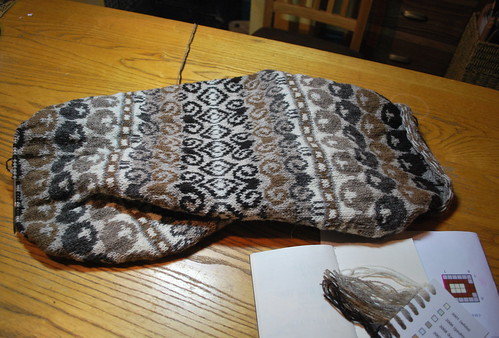
One row of ewes to go before there's steeking... eek. Must check I have a 3mm crochet hook.
The first set of the second batch of ewes was... interesting. Knitted them on Tuesday, with a temperature, and must have tinked as much as I knitted. If a row of Fair Isle sheep turns out abstract, you know there's something going wrong... Knitted along to iPlayer versions of Bake-Off for Comic Relief on Wednesday and Thursday and made more mistakes but corrected them. There is something so compelling about watching people bake things on TV. I'm really looking forward to Ed Byrne competing in the last one... Anyway, back to the blanket.
I've been reading up on Ravelry, and a lot of people found the edging was quite wavy and loose before strenuous blocking. Looking at the instructions, you need to pick up 1 st for every cast-on/cast-off stitch and nearly 1 st for every row, which seems a lot to me for a garter-stitch edging where I'd normally skip one stitch every few depending on the weight of the yarn. I'm also aware that my tension/gauge was slightly out on casting on, so I'll already have used a little more of the yarn than intended, and the yarn's meant to make both the blanket and a hat. So I think I'm going to stick to my usual thing with 4-ply yarn, picking up 4 of every 5, and that should save me a small amount of yarn; my garter-stitch tension will already be looser than my Fair Isle tension, so that might make up for it...

One row of ewes to go before there's steeking... eek. Must check I have a 3mm crochet hook.
The first set of the second batch of ewes was... interesting. Knitted them on Tuesday, with a temperature, and must have tinked as much as I knitted. If a row of Fair Isle sheep turns out abstract, you know there's something going wrong... Knitted along to iPlayer versions of Bake-Off for Comic Relief on Wednesday and Thursday and made more mistakes but corrected them. There is something so compelling about watching people bake things on TV. I'm really looking forward to Ed Byrne competing in the last one... Anyway, back to the blanket.
I've been reading up on Ravelry, and a lot of people found the edging was quite wavy and loose before strenuous blocking. Looking at the instructions, you need to pick up 1 st for every cast-on/cast-off stitch and nearly 1 st for every row, which seems a lot to me for a garter-stitch edging where I'd normally skip one stitch every few depending on the weight of the yarn. I'm also aware that my tension/gauge was slightly out on casting on, so I'll already have used a little more of the yarn than intended, and the yarn's meant to make both the blanket and a hat. So I think I'm going to stick to my usual thing with 4-ply yarn, picking up 4 of every 5, and that should save me a small amount of yarn; my garter-stitch tension will already be looser than my Fair Isle tension, so that might make up for it...
Saturday, January 19, 2013
2013 books, #1-5
On the map: why the world looks the way it does, by Simon Garfield. London: Profile, 2012.
A history of mapmaking and the makers, but done in characteristically Garfield fashion. You get the historical information, but also the curiosities around the facts which might make some of that information stick. We find out about buccaneering contemporary map collectors, historical fakes, insanely brave figures and mapmakers who mostly stayed at home and made it all up. Where maps enter popular culture, Garfield goes there as well - when talking about the Peters projection, he remembers the somewhat self-righteous attitude of those espousing the map in the 1980s alongside the wonderful Mapmakers for Social Justice segment of an episode of The West Wing. There's also an interesting discussion at the end of geographical mash-ups and GPS monitoring which suggests that although me-centric mapping is now the global trend, it's not always an unalloyed benefit.
Dodger, by Terry Pratchett [audiobook]. Read by Stephen Briggs. Oxford: Isis, 2012.
A fun piece of historical fantasy; Dodger is a fine character in the CMOT Dibbler line, and really, while there's some difference between 19th century London and Ankh-Morpork, there's so little that it's scary on occasion. Charles Dickens, Benjamin Disraeli and Henry Mayhew make appearances; and the powerful sense of justice and social inequity which enrages Pratchett in all circumstances makes this a book which Dickens and Mayhew would recognise in its raging against the characters' situations.
The worst date ever: war crimes, Hollywood heart-throbs and other abominations, by Jane Bussmann. London: Macmillan, 2009.
I can't remember where I saw the recommendation for this - I suspect it might have been in a Caitlin Moran article - but this was excellent. I remembered Jane Bussmann from the Bussmann and Quantick comedy show on Radio 4, but hadn't realised she'd then ended up in celebrity journalism in Hollywood, failing to interview Britney Spears (twice) and being threatened with legal action by Ashton Kutcher's lawyer. A combination of powerful self-loathing and an enormous crush on an international peacemaker lead Jane to Uganda and the war between the government and Joseph Kony, kidnapper of up to 30,000 children. When she gets there, she realises nothing in the international relations arena is as simple as the press coverage. By turns hilarious, heartbreaking and totally crass, this is a fantastic read. Definitely not one for the easily offended though.
The guilty plea, by Robert Rotenberg [audiobook]. Read by Paul Hecht. Rearsby, Leics.: W F Howes, 2011.
One of the directors of a major greengrocery business is found stabbed in his kitchen the night before his divorce proceedings are due to start; several hours later, his estranged wife delivers the murder weapon to her lawyers, wrapped in a tea-towel from the kitchen. It seems straightforward, but as Ari Green investigates, there are many puzzling elements. I really enjoyed the setting for this one - Toronto - and will look out for Rotenberg's other books. It's also an excellent reading with a Canadian, rather than US, reader.
The bones of Avignon, by Jefferson Bass. London: Quercus, 2012.
I really don't understand the appeal of books on the Turin Shroud/bones of Christ/Ark of the Covenant/Holy Grail etc., but they do seem to sell, so I suppose it's always worth a try for an author. What I really, really, don't understand is why an established writing team like Jefferson Bass would dip its toe in that particular swamp. I can only attribute it to the sort of curiosity which fuels so many episodes of Lassie or Skippy the Bush Kangaroo - the old planks haphazardly nailed to the entrance of the mine and the faded KEEP OUT signs are an obvious invitation to explore.
It's Jefferson Bass, so it's not horrible, although the closing scene is hilarious rather than suspense-inducing. There's a terrible romantic premise at the beginning (hero races across the Atlantic to side of damsel in distress) which was done a lot better in The West Wing, and a lot of very nice Provençal scenery. The plot is pretty uninteresting until the last 50 pages or so when it suddenly turns into the last few minutes of a Die Hard movie. There is only one real teeth-gnashing moment in the author's knowledge of France, which isn't bad going - no wonder the only dish left in a Provençal restaurant in August is "reblochon" (actually, as described, tartiflette); it's a winter dish containing unpasteurised cheese from near the Swiss border 300 miles away, and not a local summer speciality... Oh, and there's a lot of switching between the 14th and the 21st centuries.
As ever with this series, it's redeemed by the main characters and the rather strange relationship between them; if you've read the others in the series, it's worth persevering with this; please don't make this your first book by Jefferson Bass, though - any of the others is a better introduction to their usually sparkling style.
A history of mapmaking and the makers, but done in characteristically Garfield fashion. You get the historical information, but also the curiosities around the facts which might make some of that information stick. We find out about buccaneering contemporary map collectors, historical fakes, insanely brave figures and mapmakers who mostly stayed at home and made it all up. Where maps enter popular culture, Garfield goes there as well - when talking about the Peters projection, he remembers the somewhat self-righteous attitude of those espousing the map in the 1980s alongside the wonderful Mapmakers for Social Justice segment of an episode of The West Wing. There's also an interesting discussion at the end of geographical mash-ups and GPS monitoring which suggests that although me-centric mapping is now the global trend, it's not always an unalloyed benefit.
Dodger, by Terry Pratchett [audiobook]. Read by Stephen Briggs. Oxford: Isis, 2012.
A fun piece of historical fantasy; Dodger is a fine character in the CMOT Dibbler line, and really, while there's some difference between 19th century London and Ankh-Morpork, there's so little that it's scary on occasion. Charles Dickens, Benjamin Disraeli and Henry Mayhew make appearances; and the powerful sense of justice and social inequity which enrages Pratchett in all circumstances makes this a book which Dickens and Mayhew would recognise in its raging against the characters' situations.
The worst date ever: war crimes, Hollywood heart-throbs and other abominations, by Jane Bussmann. London: Macmillan, 2009.
I can't remember where I saw the recommendation for this - I suspect it might have been in a Caitlin Moran article - but this was excellent. I remembered Jane Bussmann from the Bussmann and Quantick comedy show on Radio 4, but hadn't realised she'd then ended up in celebrity journalism in Hollywood, failing to interview Britney Spears (twice) and being threatened with legal action by Ashton Kutcher's lawyer. A combination of powerful self-loathing and an enormous crush on an international peacemaker lead Jane to Uganda and the war between the government and Joseph Kony, kidnapper of up to 30,000 children. When she gets there, she realises nothing in the international relations arena is as simple as the press coverage. By turns hilarious, heartbreaking and totally crass, this is a fantastic read. Definitely not one for the easily offended though.
The guilty plea, by Robert Rotenberg [audiobook]. Read by Paul Hecht. Rearsby, Leics.: W F Howes, 2011.
One of the directors of a major greengrocery business is found stabbed in his kitchen the night before his divorce proceedings are due to start; several hours later, his estranged wife delivers the murder weapon to her lawyers, wrapped in a tea-towel from the kitchen. It seems straightforward, but as Ari Green investigates, there are many puzzling elements. I really enjoyed the setting for this one - Toronto - and will look out for Rotenberg's other books. It's also an excellent reading with a Canadian, rather than US, reader.
The bones of Avignon, by Jefferson Bass. London: Quercus, 2012.
I really don't understand the appeal of books on the Turin Shroud/bones of Christ/Ark of the Covenant/Holy Grail etc., but they do seem to sell, so I suppose it's always worth a try for an author. What I really, really, don't understand is why an established writing team like Jefferson Bass would dip its toe in that particular swamp. I can only attribute it to the sort of curiosity which fuels so many episodes of Lassie or Skippy the Bush Kangaroo - the old planks haphazardly nailed to the entrance of the mine and the faded KEEP OUT signs are an obvious invitation to explore.
It's Jefferson Bass, so it's not horrible, although the closing scene is hilarious rather than suspense-inducing. There's a terrible romantic premise at the beginning (hero races across the Atlantic to side of damsel in distress) which was done a lot better in The West Wing, and a lot of very nice Provençal scenery. The plot is pretty uninteresting until the last 50 pages or so when it suddenly turns into the last few minutes of a Die Hard movie. There is only one real teeth-gnashing moment in the author's knowledge of France, which isn't bad going - no wonder the only dish left in a Provençal restaurant in August is "reblochon" (actually, as described, tartiflette); it's a winter dish containing unpasteurised cheese from near the Swiss border 300 miles away, and not a local summer speciality... Oh, and there's a lot of switching between the 14th and the 21st centuries.
As ever with this series, it's redeemed by the main characters and the rather strange relationship between them; if you've read the others in the series, it's worth persevering with this; please don't make this your first book by Jefferson Bass, though - any of the others is a better introduction to their usually sparkling style.
Friday, January 18, 2013
Towers in the snow
I ended up leaving work at 2pm this afternoon - the trains were slowly starting to get a little more dodgy-sounding, the snow had been coming down for 5 hours, and people living near home and halfway up the line were saying they had reasonable quantities of the stuff... and I was completely unable to concentrate on what I was meant to be doing...
It's been so long since I left for the day in the light! And apart from that, I thought I'd take a couple of pictures of work in the snow... this is the little camera, but probably just as well - it was so slippery underfoot I'd have been worried about getting the big camera out.
First, here's the classic: the Elizabeth Tower, formerly the Clock Tower (as we're instructed to say at every turn, Big Ben is the name of the bell which tolls the hours); the tower was designed by Charles Barry and opened in 1858, and the bell was completed in 1859.
At the other end of the Palace, a marginally younger and somewhat larger structure - the Victoria Tower, also by Barry, opened in 1860 and housing the Parliamentary Archive.
The buildings at the other end of the London part of my journey home are also Victorian with clocks; first of all St Pancras (or, more properly, the Grand Midland Hotel which was added to the engine shed later), opened in 1873 and designed by George Gilbert Scott; more Gothic, this time in brick. Gorgeous structure, and one narrowly saved by campaigners including Sir John Betjeman; the station pub is named in his honour.
And one which is about to cast off its horrible 1972 concourse and show itself in its rather stark beauty; King's Cross station. Surprisingly to me, this is the oldest of the four; designed by Lewis Cubitt and opened in 1852. Network Rail's grand plans for this one should be complete at the end of this year; I think it's going to look splendid.
Looking at all these structures brings home to me how recent the current London landscape really is in comparison to, say, Cambridge's, and quite how much building work was being done in the 1850s and 1860s... It's not surprising London is a real and vibrant character in Dickens's novels...
It's been so long since I left for the day in the light! And apart from that, I thought I'd take a couple of pictures of work in the snow... this is the little camera, but probably just as well - it was so slippery underfoot I'd have been worried about getting the big camera out.
First, here's the classic: the Elizabeth Tower, formerly the Clock Tower (as we're instructed to say at every turn, Big Ben is the name of the bell which tolls the hours); the tower was designed by Charles Barry and opened in 1858, and the bell was completed in 1859.
At the other end of the Palace, a marginally younger and somewhat larger structure - the Victoria Tower, also by Barry, opened in 1860 and housing the Parliamentary Archive.
The buildings at the other end of the London part of my journey home are also Victorian with clocks; first of all St Pancras (or, more properly, the Grand Midland Hotel which was added to the engine shed later), opened in 1873 and designed by George Gilbert Scott; more Gothic, this time in brick. Gorgeous structure, and one narrowly saved by campaigners including Sir John Betjeman; the station pub is named in his honour.
And one which is about to cast off its horrible 1972 concourse and show itself in its rather stark beauty; King's Cross station. Surprisingly to me, this is the oldest of the four; designed by Lewis Cubitt and opened in 1852. Network Rail's grand plans for this one should be complete at the end of this year; I think it's going to look splendid.
Looking at all these structures brings home to me how recent the current London landscape really is in comparison to, say, Cambridge's, and quite how much building work was being done in the 1850s and 1860s... It's not surprising London is a real and vibrant character in Dickens's novels...
Thursday, January 17, 2013
Cold
Went to station this morning, stood there for a very long time waiting for either a train or a replacement bus, until I'd completely missed the time for the presentation I was due to give (I live 2 hours' journey, give or take, from work); came home...
At 2pm the trees outside looked like this: very Japanese print; very very cold still...

I've been working in fingerless gloves all day, with frequent breaks for refuge upstairs, where it's warmer, with the knitting. I'll be working for another couple of hours...
Winter. Bah.
At 2pm the trees outside looked like this: very Japanese print; very very cold still...

I've been working in fingerless gloves all day, with frequent breaks for refuge upstairs, where it's warmer, with the knitting. I'll be working for another couple of hours...
Winter. Bah.
Subscribe to:
Posts (Atom)



